Have you ever spent hours on a piece of artwork, only to watch it fade over time? It’s a frustrating reality for many artists, and it all comes down to something called ‘lightfastness’ – a medium’s resistance to fading over time when exposed to light. If you want your work to last, choosing supplies with good lightfast ratings is essential.
But how do we know which art supplies will hold up over time? Some brands advertise their materials as “lightfast,” but do their claims hold up in real-world conditions? That’s exactly what I set out to test. Over the past 6 months, I’ve exposed swatches of coloured pencils and markers to sunlight and tracked their changes. I also compared my results to industry-standard lightfastness tests to see how different brands truly perform.
In this blog, I’ll break down:
Whether you’re a professional artist selling your work or a hobbyist who wants their art to last, this guide will help you make informed choices about your supplies.
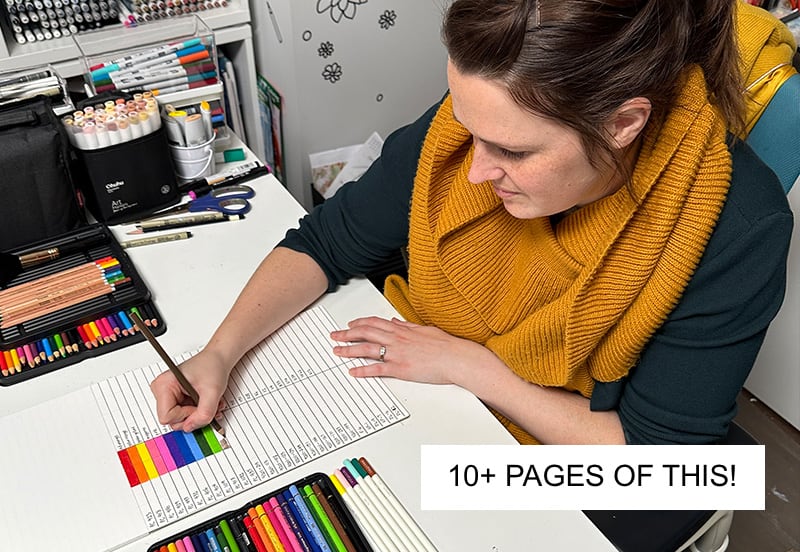
What is Lightfastness?
Lightfastness refers to how well a colour resists fading when exposed to light over time.
Art supplies that are “highly lightfast” can often last 100 years or more in museum conditions. While other art supplies might fade as soon as they see the sun. This is especially important for artists who want their work to last for years without significant colour shifts.

Fading occurs because some pigments break down when exposed to light, particularly ultraviolet (UV) rays from the sun. Different art supplies use different types of pigments and binding materials, which means some colours are naturally more resistant to fading than others. While some art materials are designed to be highly lightfast, others may start losing their vibrancy after just a few days of exposure to light.
Understanding lightfastness helps artists make better choices about their materials, whether they’re working on personal projects, commissions, or selling their art. In the next sections, we’ll explore why this matters and how it’s tested.
Why is Lightfastness Important?
Nobody wants to pour time and creativity into an artwork only to see it fade away. That’s why lightfastness (how well your colours resists fading over time) is worth paying attention to. Whether you’re colouring for fun, creating gifts, or selling your work, fading colours can be a letdown.
Art you want to display
If you enjoy displaying your artwork, lightfastness is something to consider. You probably want your art to stay true to its original colours. Artwork displayed in well-lit areas – especially near windows – can fade quickly if created with non-lightfast materials. Choosing the right supplies helps preserve your work so it can be enjoyed for years without noticeable fading or colour shifts.

Art you want to give away
If you love sharing your artwork with friends and family, lightfastness is something to consider. A beautifully coloured piece might look stunning at first, but if it starts to fade after a few months, it could lose its charm. Choosing lightfast materials ensures that your gifts remain as vibrant and meaningful as the day you gave them.

Art you want to sell
If you’re selling artwork, ensuring that your materials are lightfast is essential. Buyers expect their purchases to last, and if a piece fades within months or years, it can damage your reputation as an artist. Many professional artists specifically choose lightfast materials to guarantee their work remains vibrant for generations.

When is Lightfastness NOT Important?
Lightfastness isn’t always a top priority, and that’s completely okay! If your focus is on the process rather than the final piece, then fading might not matter to you at all. This includes things like:
- Personal work where you’re experimenting, practising, or simply enjoying the creative flow.
- Projects that you plan to scan or photograph the final piece and use it digitally or for prints rather than keeping the original.
- Artwork that stays safely tucked away in a sketchbook or colouring book, away from sunlight.
In these cases, it makes perfect sense to use whatever tools you enjoy most, regardless of their lightfast rating.
How is Lightfastness Measured?
There are three main ways to measure how much a colour fades over time:
- Blue Wool Scale – An industry standard using blue-dyed wool strips that fade at different intervals. My testing is based on this method.
- ASTM D6901 – A lab-based test for coloured pencils only, using controlled light exposure. Not suitable for markers.
- Manufacturer Ratings – Internal tests done by brands, which can vary in accuracy.
I talk about more of these in more detail in this blog post.
In short, not all “lightfast” claims are equal – so knowing how it’s measured helps you avoid being misled. I’ve researched the claims from many brands below and have included as much detail as I’ve been able to find about how each one tests their pencils and whether they follow industry standard methods.
How I Measured Lightfastness
I swatched up to 12 colours from each coloured pencil brand on archival paper, then exposed them to sunlight for 6 months – while keeping control samples in the dark. I also used a Blue Wool strip to benchmark how much each swatch faded, just like in official industry testing.
Day 1

Day 200
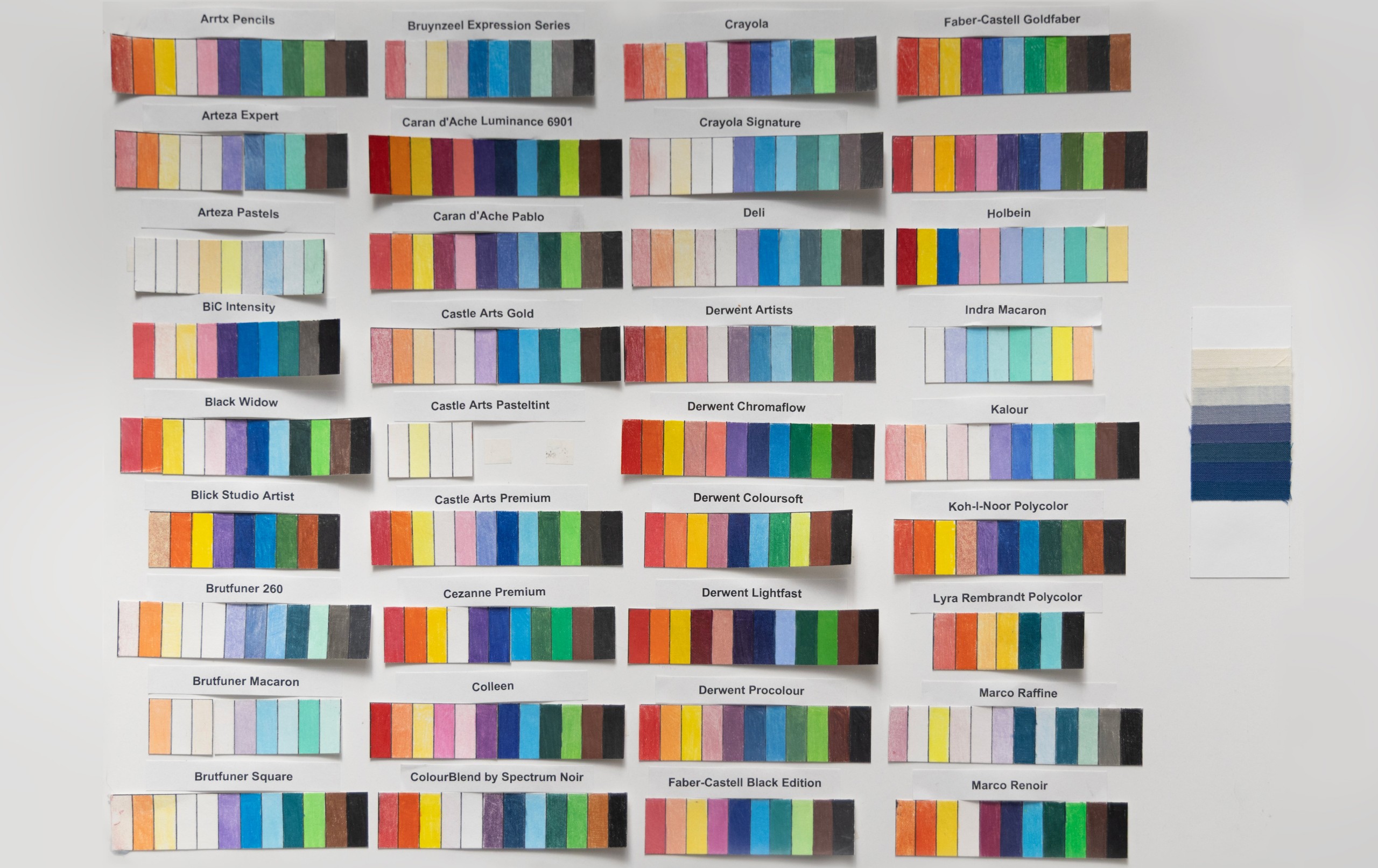
Every 2 weeks, I measured each colour using a colour scanner and recorded the results in a spreadsheet. Then, I used a colour formula known as CIEDE2000 to measure the distance between colours and find out exactly how much each colour faded over the 6 months.
In the end, I was able to accurately assign each colour with a Blue Wool Score, and convert this to an approximate ASTM Lightfastness rating, giving a clear look at how each colour and brand performed over time, in line with industry standards.
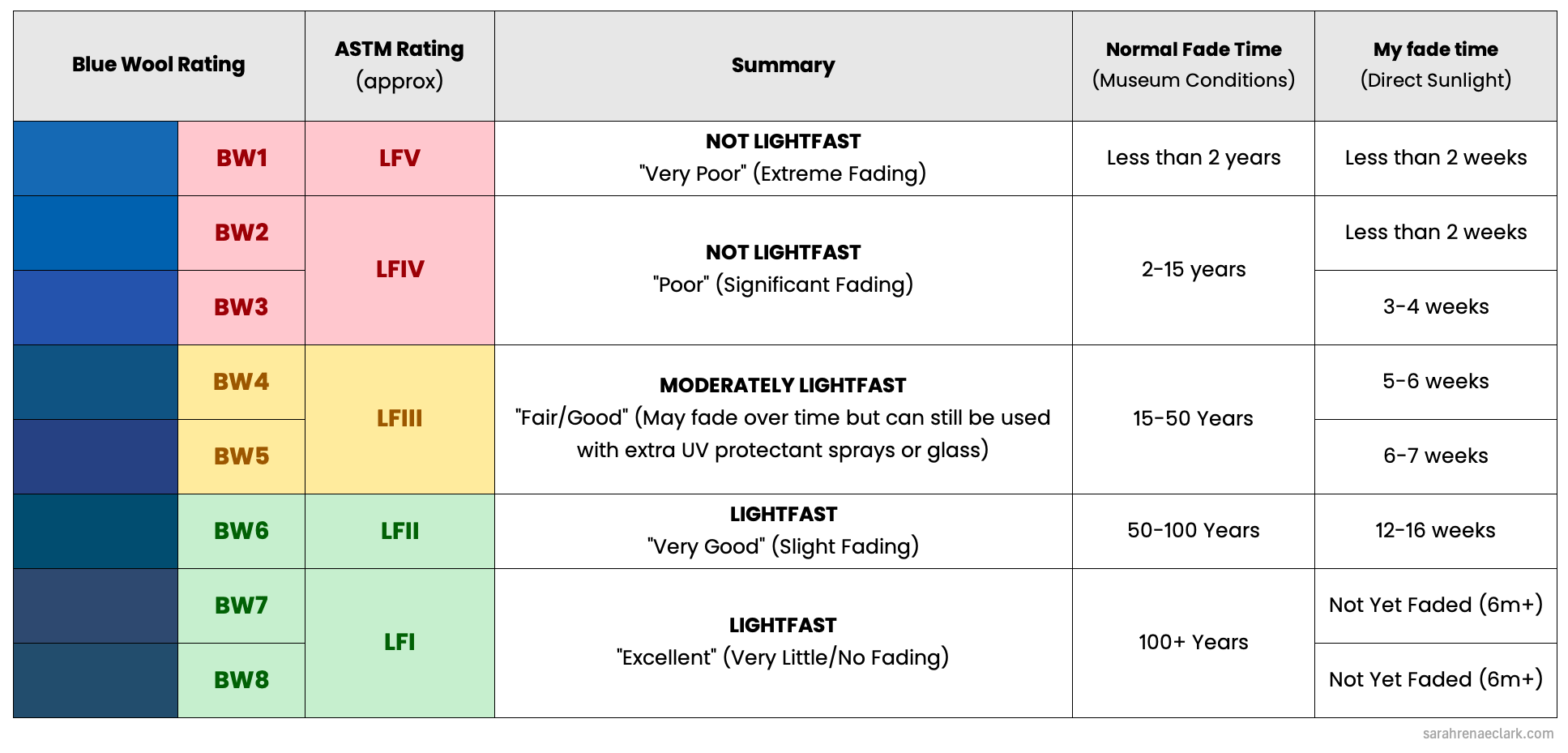
If you want to know more about my own lightfast testing method, I’ve written a very detailed (and nerdy!) explanation of my process and how it compares to the official industry tests in this blog post.
You can watch my process in this YouTube video:
PLEASE NOTE: This post contains affiliate links, which means I may earn a small commission if you make a purchase – at no extra cost to you. You can find a full list of the supplies I was given by brands at the bottom of this article. None of these brands are associated with this review in any way, and all views and interpretations are my own.
Lightfast Pencil Results:
Please Note: We’ve also listed below what we consider to be the best and worst performers in each brand. We’ve decided this based on a combination of the Blue Wool results and the total fade of each colour. In some cases, a pencil may have a higher Blue Wool score even though it has a lower total fade, based on when the fading occurred. The Blue Wool score is based on the time of the first fade, whereas the “total fade” is calculated over the full 26 weeks of testing. We consider both of these to be important factors, and either one doesn’t give enough context on its own.
Arrtx Coloured Pencils
Arrtx include lightfast ratings on every pencil, but I wasn’t able to find any information about what these ratings meant or how they were tested. I reached out directly to an Arrtx representative to ask which testing standard was used. The reply was that “Our colored pencils have not been reported for lightfastness, but they are lightfast.” I’ve requested further information, and I’m waiting to hear back. Given that there’s no public information about the testing AND no information about what each star rating means (is 1 star good or bad?), the lightfast information on each pencil seems pointless, and I was unable to cross-check them with my own scores.
You can find all the tests done with these coloured pencils here.

Lightfast Pencils*: 5/12 (42%)
Average Score: BW5-6
Average Fade: 33.0%
Best Performer: Violet – AT4171
Worst Performer: Rose Red – AT3111
Where to Buy: Amazon
Colours Tested: Chilli Pepper – AT3170 | Orange – AT3060 | Canary Yellow – AT1022 | Rose Red – AT3111 | Pink – AT4003 | Violet – AT4171 | Violet Blue – AT4212 | Deep Sky Blue – AT2025 | Chromium Oxide Green – AT5419 | Apple Green – AT5099 | Mars Brown – AT6095 | Black – AT0099
Arteza Expert Coloured Pencils
Arteza Expert have lightfast results on each pencil, with 5 being “less lightfast” and 1 being “extremely lightfast”, according to their packaging and website. In trying to compare their own testing with mine, I couldn’t match up any particular results – Their scores of 2 to 4 all seemed to be mixed up within my scores of BW3 to BW7. I reached out to them on their website, and they directed me to the same system on their pencils, but this time only highlighting 1-3 in the scoring system (good to excellent). They later clarified over Instagram DM that they “use the ASTM rating “Good” is the same as fair when compared to the Blue Wool Rating”
You can find all the tests done with these coloured pencils here.

Lightfast Pencils*: 4/11 (36%)
Average Score: BW4-5
Average Fade: 51%
Best Performer: Noir – A017
Worst Performer: Peony Pink – A401
Where to Buy: Amazon
Colours Tested: Rose Red – A205 | Pumpkin Orange – A112 | Lemon Yellow – A104 | Plum Purple – A406 | Peony Pink – A401 | Lavender – A409 | Egyptian Blue – A509 | Sky Blue – A500 | Spring Green – A601 | Hazelnut Brown – A309 | Noir – A017
Arteza Pastel Coloured Pencils
I suspect the Arteza Pastels follow the same internal system used in other Arteza ranges – likely a scale from 1 to 5, with 1 being the most lightfast, but this is not confirmed. Out of the 9 colours I tested, only one reached a Blue Wool rating of 6 or higher (the range generally considered lightfast). Compared to the other pastel sets I tested, Arteza Pastels didn’t perform well. Only 11% of the colours were lightfast. If you’re scanning your work or keeping it in a sketchbook, they might still be usable, but for anything on display, I’d be cautious.
You can find all the tests done with these coloured pencils here.

Lightfast Pencils*: 1/9 (11%)
Average Score: BW4
Average Fade: 77%
Best Performer: A119
Worst Performer: A420
Where to Buy: Amazon
Colours Tested: A627 | A621 | A516 | A423 | A214 | A119 | A313 | A420 | A419
BiC Intensity Coloured Pencils
BiC don’t make any promises about their lightfastness and don’t appear to have done any testing. In my tests, the results were mixed. Out of 9 colours, 4 scored a Blue Wool rating of 6 or higher, while the rest mostly sat in the BW 4–5 range. None fell into the lowest category, and the 6-month fade ranged from just 5% to 87%, with an average of around 32%.
You can find all the tests done with these coloured pencils here.

Lightfast Pencils*: 5/9 (56%)
Average Score: BW5-6
Average Fade: 32%
Best Performer: Black
Worst Performer: Orange
Where to Buy: Amazon
Colours Tested: Red | Orange | Yellow | Pink | Purple | Dark Blue | Blue | Brown | Black
Black Widow Coloured Pencils
These don’t seem to have been lightfast tested, although the Skin Tone range does mention on the Amazon listing that it includes lightfast ratings. I couldn’t find any other mentions or results. In testing, results were mixed across the 10 colours I sampled. 4 pencils scored a Blue Wool rating of 6 or higher, while 4 landed in the moderate BW 4–5 range. Great for colouring, but maybe not for finished work you want to keep.
You can find all the tests done with these coloured pencils here.

Lightfast Pencils*: 4/10 (40%)
Average Score: BW4-5
Average Fade: 30%
Best Performer: Black Widow – BW111
Worst Performer: Cyanide Pink – BW46
Where to Buy: Amazon
Colours Tested: Lady Bug – BW89 | Pumpkin – BW14 | Yellow Sand – SC63 | Cyanide Pink – BW46 | Fancy Pink – CB43 | Grape – CB118 | Denim – MN083 | Fang Green – BW09 | Mahogany – MN087 | Black Widow – BW111
Blick Studio Artist Coloured Pencils
Blick has ranked their pencils from I – Satisfactory to IIII – Excellent. I found a summary of their ratings, with 43 pencils being ranked “IIII – excellent” and 25 “III – very good”. While I can’t find any information about their testing process, most of their ratings seemed in line with my own, with a score of III roughly translating to BW4-5 (fair) and a score of IIII being BW6-8 (good to excellent). Overall, Blick Studio Artist pencils scored surprisingly well compared to other budget and mid-range brands.
You can find all the tests done with these coloured pencils here.

Lightfast Pencils*: 6/8 (75%)
Average Score: BW6
Average Fade: 21%
Best Performer: Black
Worst Performer: Carmine
Where to Buy: Blick
Colours Tested: Carmine | Orange | Yellow Violet | Dark Blue | Light Blue | Indian Red | Black
Brutfuner 260 Coloured Pencils
Brutfuner have advertised that some of their pencils have “good light resistance” but otherwise don’t usually mention lightfastness. Some of the sellers on Amazon have said their “lightfast and UV resistance is measured and documented” – which is the biggest non-answer I’ve found yet. I asked one of the sellers directly if they were lightfast and haven’t heard back yet. My set of pencils doesn’t mention lightfastness on the pencils or packaging.
You can find all the tests done with these coloured pencils here.

Lightfast Pencils*: 4/12 (33%)
Average Score: BW4-5
Average Fade: 57%
Best Performer: Jet Set – K12
Worst Performer: Azalea Pink – R6
Where to Buy: Amazon
Colours Tested: Flame Scarlet – R16 | Autumn Glory – Y10 | Blazing Yellow – Y50 | Rouge Red – R28 | Azalea Pink – R6 | Bright Violet – V2 | Deep Blue – V4 | Bonnie Blue – B33 | Shaded Spruce – G74 | Bright Lime Green – G34 | Frair Brown – YK62 | Jet Set – K12
Brutfuner Macaron Coloured Pencils
As mentioned above, some of Brutfuner’s advertising suggests that they are lightfast – but without any real detail, it’s hard to take those claims seriously. In testing, the Macaron pastels didn’t perform well. Only 2 of the 9 colours reached a Blue Wool rating of 6 or higher, with most landing in the moderate BW 4–5 range. Not the worst among pastels, but definitely fading a lot overall. They fared a little better than the Arteza and Castle Arts pastels but still came in behind Holbein overall.
You can find all the tests done with these coloured pencils here.
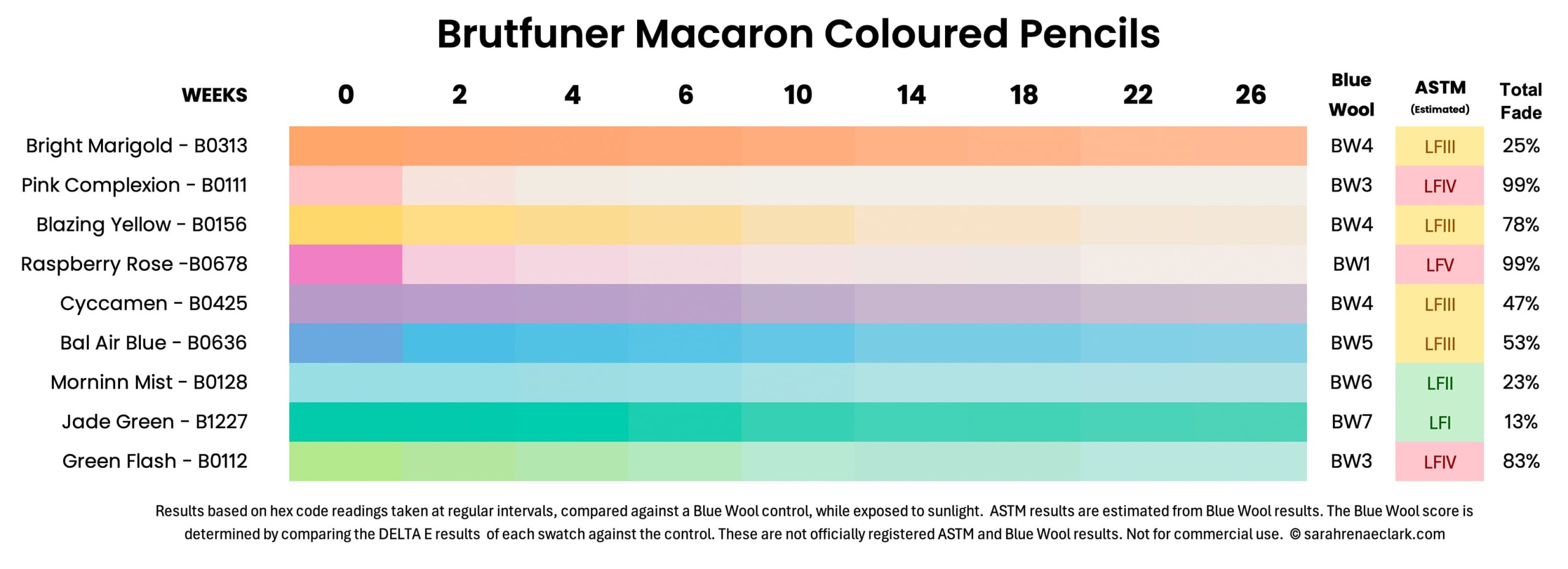
Lightfast Pencils*: 2/9 (22%)
Average Score: BW4-5
Average Fade: 58%
Best Performer: Jade Green – B1227
Worst Performer: Raspberry Rose – B0678
Where to Buy: Amazon
Colours Tested: Bright Marigold – B0313 | Pink Complexion – B0111 | Blazing Yellow – B0156 | Raspberry Rose -B0678 | Cyccamen – B0425 | Bal Air Blue – B0636 | Morninn Mist – B0128 | Jade Green – B1227 | Green Flash – B0112
Brutfuner Square Coloured Pencils
Brutfuner have claimed “good light resistance” in some Amazon listings, but there’s no mention of lightfastness on the packaging or pencils themselves. I contacted a seller to ask for more details but haven’t heard back so far. Out of 11 colours tested in the Square range, 6 reached a Blue Wool rating of 6 or higher, 2 landed in the moderate range (BW 4–5), and 3 scored in the lowest tier (BW 1–3) with very heavy fading.
You can find all the tests done with these coloured pencils here.

Lightfast Pencils*: 6/11 (55%)
Average Score: BW4-5
Average Fade: 58%
Best Performer: Black – 028
Worst Performer: Bright Pink – 061
Where to Buy: Amazon
Colours Tested: Red – 009 | Orange – 005 | Yellow – 002 | Bright Pink – 061 | Soft Pink – 012 | Purple – 053 | Dark Blue – 086 | Soft Blue – 038 | Light Green – 076 | Brown – 117 | Black – 028
Bruynzeel Expression Series Coloured Pencils
I couldn’t find any evidence that these pencils have been tested for lightfastness, and there are no ratings listed on the packaging or pencils. In testing, 3 of the 9 colours reached a Blue Wool rating of 6 or higher, with 5 sitting in the moderate 4–5 range. Only 1 pencil landed in the lowest category. Overall, most colours performed reasonably well.
You can find all the tests done with these coloured pencils here.

Colours Tested: 723 | 720 | 711 | 761 | 744 | 741 | 779 | 771 | 709
Caran d’Ache Luminance Coloured Pencils
Caran d’Ache Luminance have been specifically designed for exceptional fade resistance and have been tested according with the universal ASTM D6901 standard. Every pencil in the set is rated as highly lightfast, as LFI or LFII, making them one of the few brands where every pencil is suitable for commission work. You can see the individual ratings on each pencil and on the color charts available on their website.
You can find all the tests done with these coloured pencils here.

Colours Tested: Scarlet – 070 | Orange – 030 | Bismuth Yellow – 810 | Purplish Red – 350 | Anthraquinoid Pink – 571 | Violet – 120 | Prussian Blue -159 | Light Blue – 161 | Dark English Green – 729 | Spring Green – 470 | Burnt Siena – 069 | Black – 009
Caran d’Ache Pablo Coloured Pencils
Caran d’Ache Pablo are advertised as having excellent light resistance, and provide clear information on their website and pencils about how each pencil is rated, with 1 star being good and 3 stars being excellent. These scores are based on the Blue Wool scale scores at 150hrs of light exposure. From the few I tested, it seems that a score of 3 is about the same as BW7-8 (LFI) and 2 seems closer to BW4-6 (LFII-III). Both their scores and mine showed that most pencils fall within a BW4-7 range. 45 of their pencils have the highest rating in their own testing.
You can find all the tests done with these coloured pencils here.

Colours Tested: Scarlet – 070| Flame Red – 050 | Canary Yellow – 250 | Purplish Red – 350 | Pink – 081 | Violet – 120 | Ultramarine – 140 | Light Blue – 161 | Dark Green – 229 | Yellow Green – 230 | Brown – 059 | Ivory Black – 496
Castle Arts Gold Coloured Pencils
Castle Arts directly address lightfastness on their FAQ page, saying: In the absence of a universally recognised system for lightfast testing, we carry out a range of in-house tests to see how our colored pencils perform. It is widely accepted that certain colors are more liable to fade over time… I tried to reach out to them on Instagram for more information on their testing, but haven’t heard back. Beyond this, I haven’t been able to find any ratings.
You can find all the tests done with these coloured pencils here.

Lightfast Pencils*: 0/10 (0%)
Average Score: BW3-4
Average Fade: 48%
Best Performer: Ivory Black – 071
Worst Performer: Azalea Pink – 082
Where to Buy: Amazon
Colours Tested: Cadmium Orange Deep – 079 | Cadmium Yellow Light – 004 | French Rose – 189 | Azalea Pink – 082 | Mauve Deep – 090 | Ultramarine – 044 |
Cerulean Blue Middle – 099 | Castle Green Light – 059 | Van Dyck Brown – 069 | Ivory Black – 071
Castle Arts Pasteltint Coloured Pencils
Castle Arts mention lightfastness on their website, noting that they conduct in-house testing since there’s no single universal standard. They also acknowledge that certain colours are more likely to fade over time. I reached out to them on Instagram for more detail but haven’t heard back, and I couldn’t find any specific ratings for the Pasteltint set on the pencils or packaging. In testing, none of the 4 colours I sampled reached the lightfast threshold of Blue Wool 6 or higher. These showed the highest overall fading of any pastel set, performing the worst in terms of both fade and lightfastness when compared to the other pastel pencils tested.
You can find all the tests done with these coloured pencils here.

Lightfast Pencils*: 0/4 (0%)
Average Score: BW3-4
Average Fade: 86%
Best Performer: Saffron – 003PT
Worst Performer: Camelia – 044PT
Where to Buy: Amazon
Colours Tested: Camelia – 044PT | Peach Cream – 012PT | Saffron – 003PT | Petunia Pink – 007PT
Castle Arts Premium Coloured Pencils
Castle Arts mention lightfastness on their FAQ page and say they use in-house testing, but I haven’t seen any official ratings or details for this range. Out of the 11 colours I tested, 7 reached a Blue Wool rating of 6 or higher. 3 landed in the moderate 4–5 range, and just 1 scored in the lowest category. Most colours held up well, especially the darker tones.
You can find all the tests done with these coloured pencils here.

Lightfast Pencils*: 7/11 (64%)
Average Score: BW5-6
Average Fade: 26%
Best Performer: Ivory Black – 071
Worst Performer: Cherry Pink – 032
Where to Buy: Amazon
Colours Tested: Scarlet Red – 022 | Cadmium Orange – 017 | Lemon Yellow – 005 | Cherry Pink – 032 | Rose Pink – 034 | Ultramarine – 043 | Cobalt Turquoise – 048 | Prussian Green – 055 | Leaf Green Middle – 060 | Burnt Umber – 068 | Ivory Black – 071
Cezanne Premium Coloured Pencils
Both the packaging and the Amazon product listings say that the Cezanne Premium pencils “have good lightfastness ratings”, but they’re not documented anywhere I’ve been able to find. The pencils themselves don’t have any ratings on them either.
You can find all the tests done with these coloured pencils here.

Lightfast Pencils*: 4/9 (44%)
Average Score: BW5-6
Average Fade: 25%
Best Performer: Black – 033
Worst Performer: Pink – 004
Where to Buy: Amazon
Colours Tested: Red – 001 | Orange – 013 | Yellow – 016 | Pink – 004 | Dark Blue – 040 | Blue – 030 | Dark Green – 009 | Brown – 020 | Black – 033
Colleen Coloured Pencils
There’s no indication these have been tested for lightfastness, but they’re also not making any bold claims about it. Out of the 10 pencils I tested, 5 were lightfast and 5 fell into the moderate range. None landed in the lowest category. Some colours faded more than others, but overall, these held up quite well.
You can find all the tests done with these coloured pencils here.

Lightfast Pencils*: 5/11 (36%)
Average Score: BW4-5
Average Fade: 45%
Best Performer: Black
Worst Performer: 110
Where to Buy: Amazon
Colours Tested: 104 | 406 | 403 | 109 | 110 | 705 | 302 | 211 | 507 | Black
ColourBlend By Spectrum Noir Coloured Pencils
Some of Spectrum Noir’s product listings on Amazon and articles on their website say “lightfast artist’s quality pigment” and “Superior light fastness rated ‘Very Good’ (50-100 years)” They don’t clarify if this only applies to specific pencils (it’s assumed it’s the whole set). There’s also a comparison table on their Amazon listings that claims ALL Spectrum Noir pencil ranges are lightfast. This doesn’t line up at all with my own results below.
You can find all the tests done with these coloured pencils here.

Lightfast Pencils*: 6/12 (50%)
Average Score: BW4-5
Average Fade: 28%
Best Performer: Ginger
Worst Performer: Petal
Where to Buy: Amazon
Colours Tested: Poppy | Nectarine | Daffidol | Fuchsia | Petal | Blackberry | Twilight Blue | Denim Blue | Alpine | Shamrock | Ginger | Black
Crayola Coloured Pencils
Crayola don’t make any claims about lightfastness, which is fair enough – they’re not marketed as professional products. Out of 12 Crayola colours tested, 6 were lightfast and only 1 scored poorly. The rest sat in the moderate range, with some surprisingly strong results. These performed better than expected, especially for a kids set.
You can find all the tests done with these coloured pencils here.

Colours Tested: Red Orange | Yellow Orange | Golden Yellow | Magenta | Pink | Red Violet | Blue | Cornflower | Pine Green | Granny Smith Apple | Cocoa
Black
Crayola Signature Coloured Pencils
Crayola Signature also skips any mention of lightfastness. Out of 12 tested, only 2 were lightfast and 2 faded badly. Most fell into the moderate category, but overall, they were considerably less lightfast than the standard Crayola kids set – which was a bit of a surprise, especially considering Signature is meant to be the more “adult colouring” line
You can find all the tests done with these coloured pencils here.
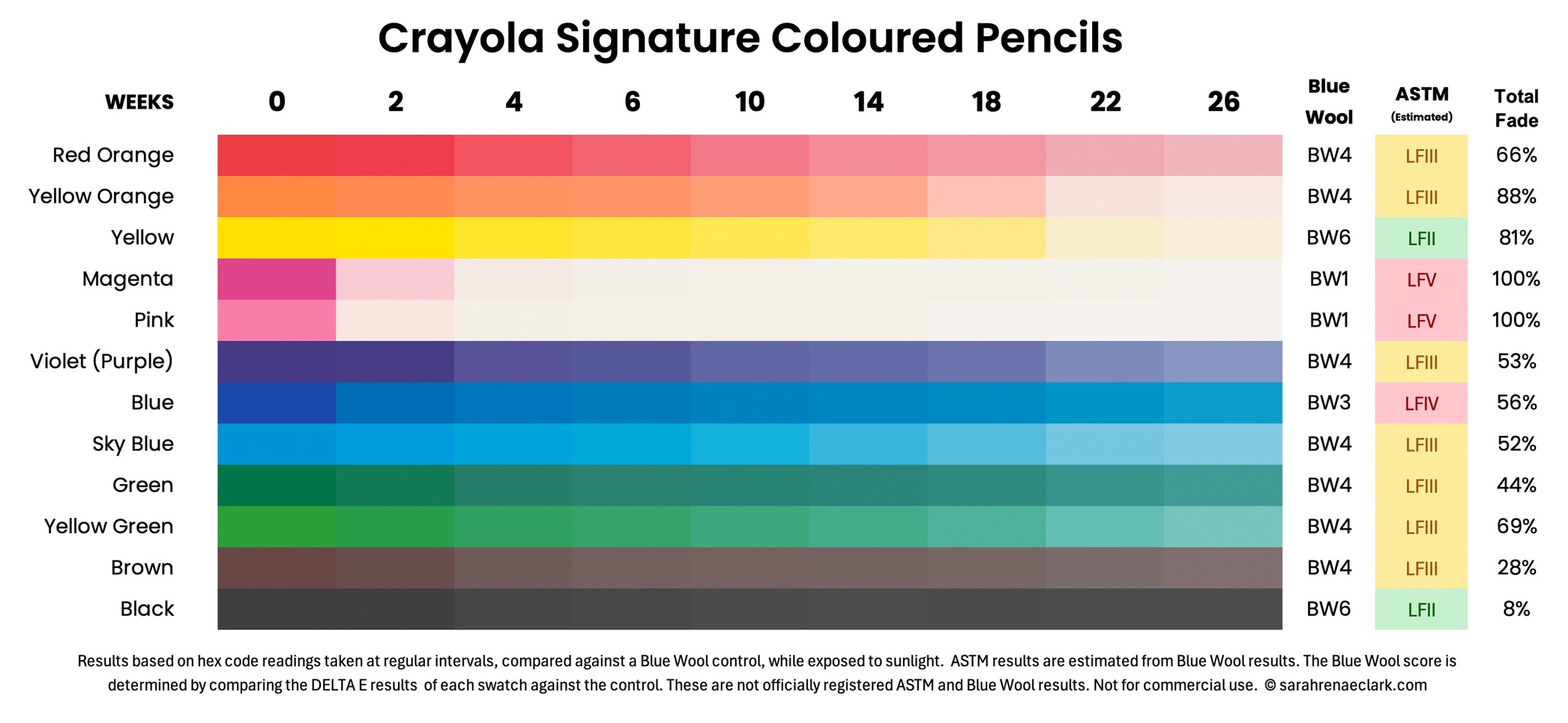
Colours Tested: Red Orange | Yellow Orange | Yellow | Magenta | Pink | Violet (Purple) | Blue | Sky Blue | Green | Yellow Green | Brown | Black
Deli Coloured Pencils
Deli don’t mention lightfastness anywhere on the packaging, and I couldn’t find any test results online. Out of the 12 colours I tested, 3 were lightfast, 8 landed in the moderate category, and just 1 faded badly. Overall these performed very similarly to other affordable pencils.
You can find all the tests done with these coloured pencils here.
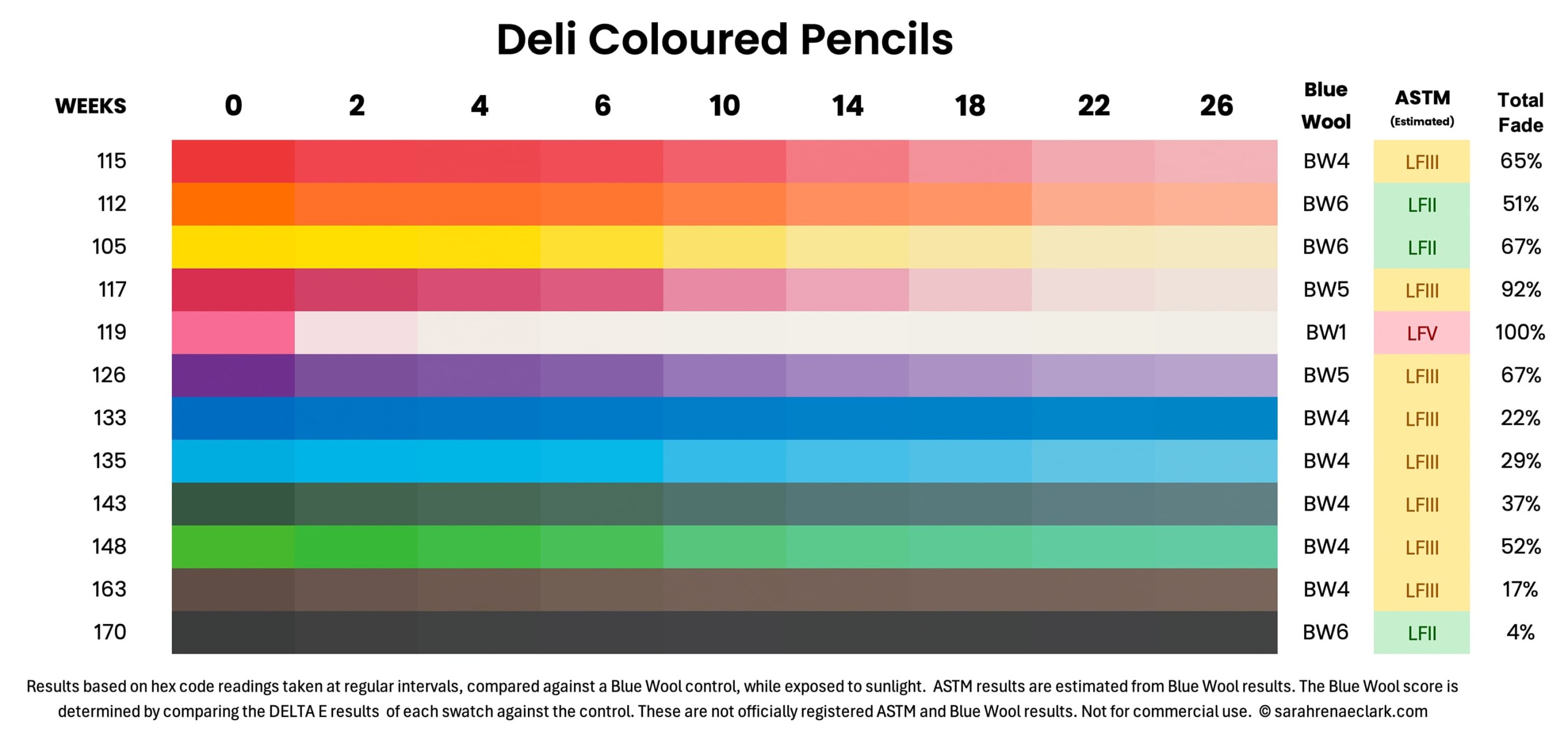
Lightfast Pencils*: 3/12 (25%)
Average Score: BW4-5
Average Fade: 50%
Best Performer: 170
Worst Performer: 119
Where to Buy: Amazon
Colours Tested: 115 | 112 | 105 | 117 | 119 | 126 | 133 | 135 | 143 | 148 | 163 | 170
Derwent Artists Coloured Pencils
Derwent tests their Derwent Artists pencils using the Blue Wool method, and they provide a full lightfastness chart on their website. According to their site, 79% of the colours in the range are rated as lightfast – meaning they’re expected to remain unchanged for 100 years under museum conditions. Of the 12 colours I tested, 5 were lightfast and 7 were in the moderate range. None landed in the lowest category, though a few did show more noticeable fading than others. Most colours still performed quite well overall.
You can find all the tests done with these coloured pencils here.

Colours Tested: Madder Carmine – 1900 | Spectrum Orange – 1100 | Deep Cadmium – 0600 | Rose Madder Lake – 2100 | Rose Pink – 1800 | Imperial Purple – 2300 | Ultramarine – 2900 | Light Blue – 3300 | Mineral Green – 4500 | Grass Green – 4700 | Venetian Red – 6300 | Ivory Black – 6700
Derwent Chromaflow Coloured Pencils
According to their website, Derwent uses the Blue Wool test (ISO 105) to evaluate lightfastness. Their pencils are graded 1-8 (Matching the Blue Wool ratings). Derwent Chromaflow pencils have been tested to be 68% lightfast across 150 colours. The full chart of colours and lightfast ratings is available on their website. Out of the 11 colours I tested, 8 were lightfast and 3 were in the moderate range. None landed in the lowest category. I was really impressed with how these performed overall.
You can find all the tests done with these coloured pencils here.

Colours Tested: Pure Red – 0510 | Red Orange – 0430 | Sun Yellow – 0100 | Hot Pink – 0810 | Blush Pink – 0800 | Lilac – 1000 | Violet Blue – 1120 | Blue – 1300 | Grass Green – 1800 | Raisen – 2000 | Black – 2300
Derwent Coloursoft Coloured Pencils
These use the same Blue Wool lightfast testing system as the other Derwent ranges. The company reports that 88% of the colours are considered lightfast, with a full chart of ratings available on their website. Out of the 8 colours I tested, 5 were lightfast, 2 landed in the moderate range, and 1 faded heavily. It seems most of Derwent’s products have performed above average compared to all the pencils I tested.
You can find all the tests done with these coloured pencils here.

Colours Tested: Red – C120 | Bright Orange – C080 | Deep Cadmium – C040 | Deep Fuchsia – C140 | Indigo – C300 | Lime Green – C460 | Dark Terracotta – C610 | Black – C650
Derwent Lightfast Coloured Pencils
Derwent Lightfast pencils have been officially tested for lightfastness using the ASTM D6901 standard. Every pencil is individually rated, with the full chart published on their website and the rating printed directly on the pencil. The entire set is either LFI or LFII, making it one of the most dependable options available for professional or commissioned work. In my own testing, 2 of the pencils were closer to LFIII, but the fading was hardly noticeable, even after 6 months.
You can find all the tests done with these coloured pencils here.

Colours Tested: Scarlet | Flame | Banana | Magenta | Dusky Pink | Violet | Deep Blue | Mid Ultramarine | Mountain Green | Grass Green (70%) | Venetian Red | Mars Black
Derwent Procolour Coloured Pencils
Derwent Procolour pencils are also tested using the Blue Wool scale. According to their website, 72% of the colours are rated as lightfast under museum conditions. A full chart of ratings is available online. Out of the 11 colours I tested, 3 were lightfast, 7 landed in the moderate range, and 1 scored in the lowest category. Most of the colours held up reasonably well.
You can find all the tests done with these coloured pencils here.

Colours Tested: Primary Red – 12 | Deep Chrome – 09 | Buttercup Yellow – 03 | Cerise Pink – 20 | Imperial Purple – 26 | Prussian Blue – 32 | Spectrum Blue – 34 | Sap Green – 46 | Grass Green – 49 | Nutmeg – 65 | Ivory Black – 71
Faber-Castell Black Edition Coloured Pencils
The Faber-Castell Black Edition coloured pencils don’t seem to have been tested for lightfastness, and there are no claims made on the packaging or website. Out of the 10 colours I tested, 5 were lightfast and 5 fell into the moderate range. None landed in the lowest category, and overall they held up better than I expected for a set with no lightfast information.
You can find all the tests done with these coloured pencils here.

Lightfast Pencils*: 5/10 (50%)
Average Score: BW5-6
Average Fade: 22%
Best Performer: Black
Worst Performer: Orange
Where to Buy: Amazon
Colours Tested: Red | Orange | Yellow | Pink | Dark Blue | Light Blue | Dark Green | Light Green | Brown | Black
Faber-Castell GoldFaber Coloured Pencils
The Faber-Castell website and packaging describes the Goldfaber pencils as having excellent lightfastness but there are no specific ratings for each pencil, and no further information on any testing done. Faber-Castell has used the Blue Wool Method to test other supplies in their range, so it’s possible (but not confirmed) that they’ve used this same method for Goldfaber.
You can find all the tests done with these coloured pencils here.

Colours Tested: 121 | 115 | 107 | 125 | 147 | 163 | 166 | 176 | 199 | 187
Faber-Castell Polychromos Coloured Pencils
Faber-Castell have tested their coloured pencils against the Blue Wool Standard, with 1 star being a BW3-BW4, 2 stars being BW5-BW6, and 3 stars being BW7-BW8. The Polychromos lightfast ratings are available on the Faber-Castell website, and 102 out of 120 in their set have a rating of 3 stars, being the highest lightfastness rating. (They also make a point on their website of saying that the Blue Wool test is more accurate than the ASTM D6901 that other professional brands use… interesting!)
You can find all the tests done with these coloured pencils here.

Colours Tested: Deep Scarlet Red – 219 | Orange Glaze – 113 | Dark Cadmium Yellow – 108 | Fuchsia – 123 | Pink Madder Lake – 129 | Mauve – 249 | Helioblue Reddish – 151 | Skyblue – 146 | Permanent Green Olive – 167 | Light Green – 171 | Burnt Siena – 283 | Schwarz, Black – 9201-199
Holbein Coloured Pencils
Holbein have tested their own pencils with the ASTM 6901 method, although not recognised officially by ASTM. On their website, they detail their process more than most brands I’ve seen, and they are one of the only brands I’ve seen that use a spectrometer instead of judging the colour changes by eye. Their star rating goes from 0 stars (LFV) to 3 stars (LFII and LFI) with just under half of their set scoring the highest 3 star rating. They also make a point of stating on their website that their highly attuned and scientific instruments make their results more accurate than the subjective Blue Wool Method. These were also notably the best performers out of the pastel coloured pencil brands.
You can find all the tests done with these coloured pencils here.

Lightfast Pencils*: 6/11 (55%)
Average Score: BW5-6
Average Fade: 24%
Best Performer: Carmine – OP 042
Worst Performer: Wisteria – OP 430
Where to Buy: Amazon
Colours Tested: Carmine – OP 042 | Canary Yellow – OP 147 | Cobalt Blue – OP 347 | Cosmos – OP 437 | Rose Pink – OP 429 | Wisteria – OP 430 | Aqua – OP 323 | Horizon Blue – OP 312 | Jade Green – OP 227 | Lettuce Green – OP 222 | Cream – OP 127
Indra Macaron Coloured Pencils
Indra don’t make any claims about lightfastness on their website or packaging. I couldn’t find any ratings or test results from the brand, and nothing on the pencils themselves suggests they’ve been tested for fade resistance. In my own testing, the results were mixed. Out of 8 colours tested, 3 reached a Blue Wool rating of 6 or higher, and 3 landed in the 1–3 range. They performed better than Arteza, Brutfuner, and Castle Arts’ pastels in lightfastness.
You can find all the tests done with these coloured pencils here.

Lightfast Pencils*: 3/8 (38%)
Average Score: BW4-5
Average Fade: 46%
Best Performer: IC-029
Worst Performer: IC-003
Where to Buy: Amazon
Colours Tested: IC-003 | IC-005 | IC-024 | IC-029 | IC-013 | IC-018 | IC-025 | IC-028
Kalour Coloured Pencils
Kalour have lightfastness ratings on every pencil and have many references to lightfastness in their advertising, but I was unable to find any information about how they do their testing. Further to this, their only reference of what the pencil scores mean is within the tin, and appears to be incorrect. For example, they rate their pink pencil as the highest lightfastness and their black as the worst. This mistake is repeated in a few of their boxes. The results on their pencils at the moment directly contradict their own claims of “unsurpassably lightfast” and “unwavering quality and lightfastness” (on their advertising and on the packaging) with their own results stating that NONE of their pencils are “extremely lightfast” (rated 1). Even with the results reversed, most of their pencils sit within the middle range, which would be considered “fairly lightfast with some fading” under any other scoring system.
You can find all the tests done with these coloured pencils here.

Lightfast Pencils*: 1/11 (9%)
Average Score: BW4-5
Average Fade: 49%
Best Performer: Black – 203
Worst Performer: Light Pink – 010
Where to Buy: Amazon
Colours Tested: Red – 008 | Orange – 033 | Creamy Yellow – 046 | Magenta – 016 | Light Pink – 010 | Purple – 154 | Cerulean Blue – 082 | Dark Green – 124 | Spring Green – 102 | Coffee – 182 | Black – 203
Koh-I-Noor Polycolor Coloured Pencils
The Koh-I-Noor Polycolor have been tested for lightfastness and include lightfastness ratings on their coloured pencil charts. The chart says the “lightfastness values are determined on the basis of real test results. 5 stars indicates features of the highest resistance.” 67% of their pencils scored a 4 or 5, which seems to match up with the BW6-8 rating in my testing.
You can find all the tests done with these coloured pencils here.

Colours Tested: Vermillion – 089 – 6 | Orange – 059 – 5 | Yellow – 059 – 3 | Carmine – 388 – 7 | Violet – 089 – 13 | Dark Blue – 439 – 19 | Light Blue – 129 – 18 | Dark Green – 249 – 26 | Grass Green – 059 – 25 | Brown – 239 – 30 | Black – 079 – 36
Lyra Rembrandt Polycolor Coloured Pencils
The Lyra website says their Polycolor range “contains permanent pigments resistant to UV rays.” It includes individual lightfastness ratings for each pencil. The tin also includes this information, and clarifies that 3 stars means “extremely good lightfastness”, 2 stars means “good lightfastness” and 1 star means “lightfastness satisfying”. 70% of their pencils are rated 3 stars, including all of the pencils I tested, so I have been unable to work out an accurate conversion between their ratings and Blue Wool or ASTM.
You can find all the tests done with these coloured pencils here.

Colours Tested: Scarlet Lake – 2000018 | Dark Orange – 2000015 | Orange Yellow – 2000009 | Aquamarine – 2000054 | Black – 2000099
Marco Raffine Coloured Pencils
There’s no mention of lightfastness on Marco Raffine’s packaging or in any of the official listings I could find. Out of the 12 colours I tested, only 2 were lightfast. The rest sat in the moderate to poor range, with 4 pencils landing in the lowest category and fading significantly. Not a great pick if you’re after longevity.
You can find all the tests done with these coloured pencils here.

Lightfast Pencils*: 2/12 (17%)
Average Score: BW4-5
Average Fade: 57%
Best Performer: 570
Worst Performer: 506
Where to Buy: Amazon
Colours Tested: 511 | 506 | 503 | 512 | 516 | 527 | 529 | 532 | 545 | 543 | 556 | 570
Marco Renoir Coloured Pencils
The tin says “superior quality pigments for brilliant, lightfast colors,” but I couldn’t find any specific ratings or evidence of testing. I reached out to a few sellers who all confirmed they were “lightfast,” but none followed up when I asked how that was tested or what it actually meant. Out of the 11 colours I tested, 4 were lightfast, 5 were moderate, and 2 faded heavily. Some colours held up nicely, but the set was inconsistent overall.
You can find all the tests done with these coloured pencils here.

Lightfast Pencils*: 4/11 (36%)
Average Score: BW5-6
Average Fade: 28%
Best Performer: 10
Worst Performer: 71
Where to Buy: Amazon
Colours Tested: 31 | 46 | 19 | 71 | 59 | 91 | 51 | 61 | 60 | 44 | 10
Marco Tribute Coloured Pencils
Marco Tribute have recently done lightfast testing and included a new Lightfast Collection logo on their pencil tins. They used a xenon lamp radiation test for 22 hours according to the standards GB/T8427 and GB/T730, which are Chinese textile lightfast test standards. The pencils now have lightfast ratings on them too, with ratings from 1 to 3 stars, with 1 being reasonably lightfast, 2 being lightfast and 3 being very lightfast. They have provided a few testing results to support their conclusion that the set has good lightfastness. My only concerns are that the testing was extremely short (22 hours), and the results shown are only a few colours, being colours that seem to perform well in every brand. In my own testing, they weren’t much different to other similar brands.
You can find all the tests done with these coloured pencils here.
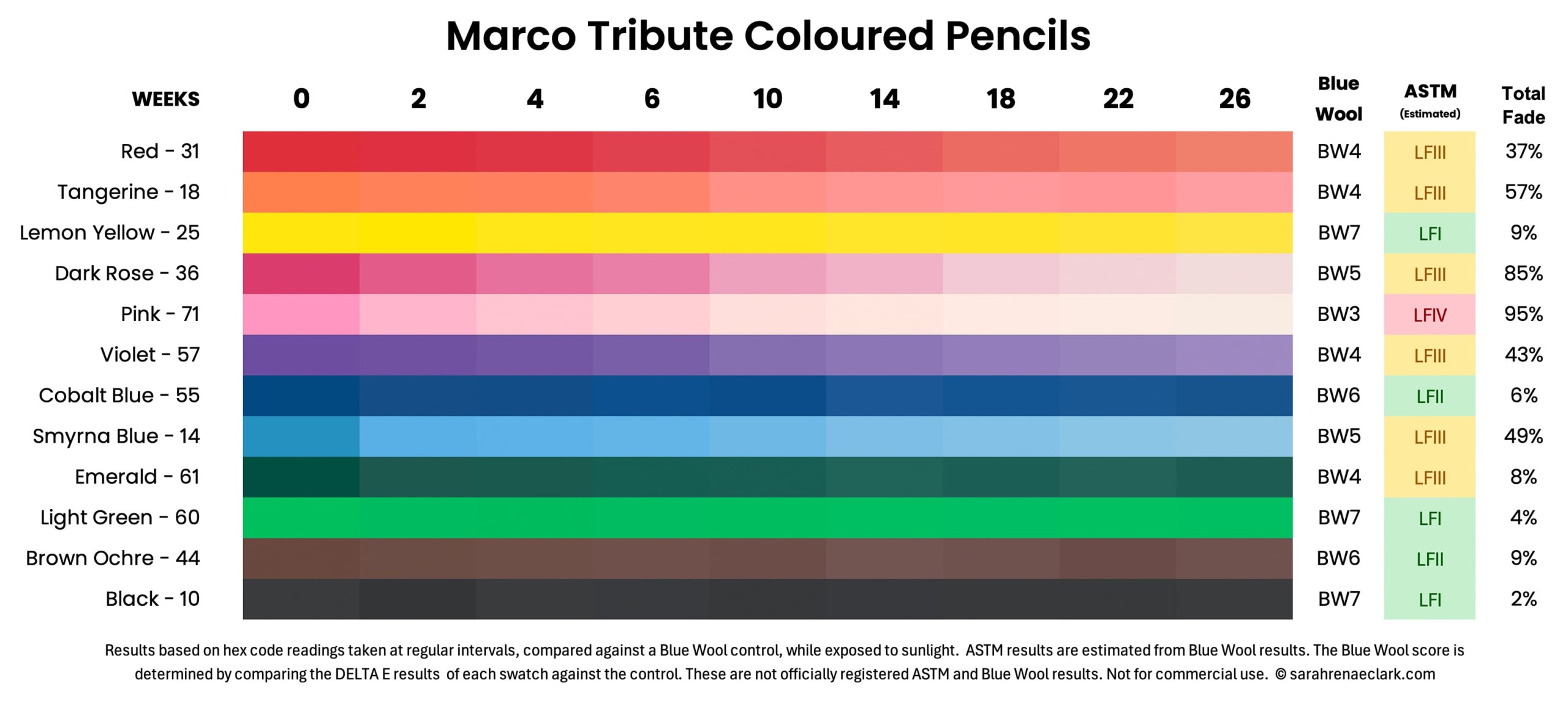
Lightfast Pencils*: 5/12 (42%)
Average Score: BW5-6
Average Fade: 34%
Best Performer: Black-10
Worst Performer: Pink – 71
Where to Buy: Amazon
Colours Tested: Red – 31 | Tangerine – 18 | Lemon Yellow – 25 | Dark Rose – 36 | Pink – 71 | Violet – 57 | Cobalt Blue – 55 | Smyrna Blue – 14 | Emerald – 61 | Light Green – 60 | Brown Ochre – 44 | Black – 10
Markart/Nyoni Coloured Pencils
Markart and Nyoni are the same pencils, branded differently. Nyoni’s listings on Ali Express describe them as lightfast. I did find one picture of a colour chart that included star ratings from 1 to 5, but no details to confirm these were lightfast ratings or what they meant. I also reached out to several sellers, who said they were lightfast but didn’t understand my follow-up questions.
You can find all the tests done with these coloured pencils here.

Lightfast Pencils*: 5/11 (45%)
Average Score: BW4-5
Average Fade: 39%
Best Performer: N028
Worst Performer: N012
Where to Buy: Amazon
Colours Tested: N007 | N004 | N003 | N010 | N012 | N015 | N033 |N046 | N045 | N024 | N028
PhoenixColor 50 Set Coloured Pencils
PhoenixColor is vague on lightfastness, and their advice to consumers would suggest their pencils haven’t been through any specific testing. “Different colours have different light resistance, it is recommended to save the finished work in the dark.” I appreciate that they give proper advice instead of making claims like many other brands have.
You can find all the tests done with these coloured pencils here.

Lightfast Pencils*: 8/11 (73%)
Average Score: BW5-6
Average Fade: 26%
Best Performer: Black
Worst Performer: Magenta
Where to Buy: Amazon
Colours Tested: Red | Orange | Yellow | Magenta | Pink | Purple | Sky Blue | Green | Light Green | Brown | Black
Prismacolor Premier Coloured Pencils
Prismacolor include individual lightfast ratings on their website and colour charts. They have followed the ASTM method of testing, although it was many years ago and their manufacturing facilities have since moved, so it would be worthwhile for them to retest the current pencils. I found their test results to be fairly similar to my own, and they were one of the only brands whose scores were higher in my testing than the scores they’ve officially reported. According to their own tests, over half of their pencils fall in the LFI and LFII categories, being highly lightfast.
You can find all the tests done with these coloured pencils here.
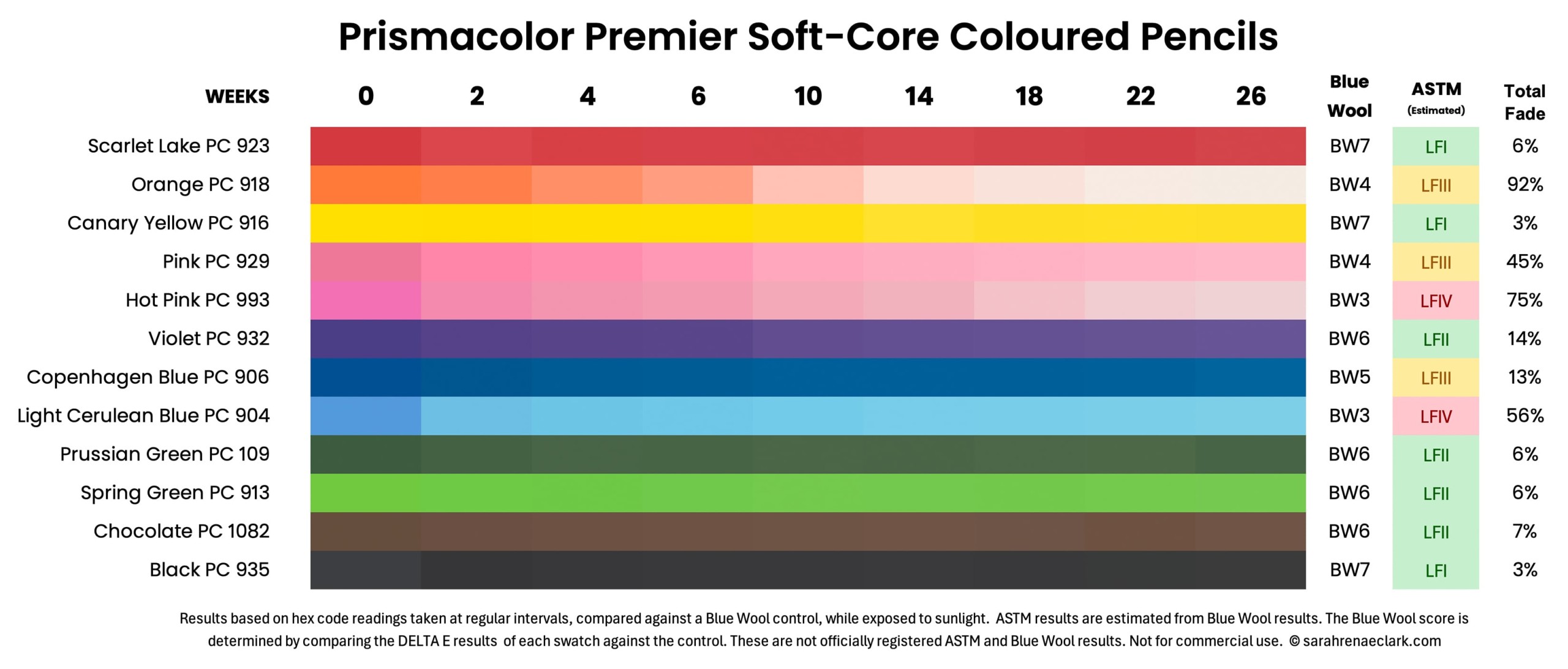
Colours Tested: Scarlet Lake PC 923 | Orange PC 918 | Canary Yellow PC 916 | Pink PC 929 | Hot Pink PC 993 | Violet PC 932 | Copenhagen Blue PC 906 | Light Cerulean Blue PC 904 | Prussian Green PC 109 | Spring Green PC 913 | Chocolate PC 1082 | Black PC 935
Prismacolor Scholar Coloured Pencils
Prismacolor Scholar don’t include any lightfastness information on their packaging or on their online listings, and I couldn’t find any test results to go by. Out of the 11 colours I tested, 4 were lightfast, 5 fell into the moderate range, and 2 showed heavy fading. A few colours performed well, but overall the results were inconsistent.
You can find all the tests done with these coloured pencils here.

Colours Tested: Crimson Lake – 325 | Orange – 318 | Lemon Yellow – 315 | Peach – 339 | Violet – 332 | Copenhagen Blue – 306 | Permanent Blue – 303 | Dark Green – 308 | Permanent Green – 310 | Dark Brown – 346 | Black – 335
Prismacolor Verithin Coloured Pencils
Prismacolor describes these as having richly saturated, lightfast pigments, and they include individual ASTM ratings for each colour on their website. In my testing, the Verithins performed closely to what Prismacolor reported – sometimes even better. Out of the 12 colours I tested, 7 were lightfast, 3 were moderate, and 2 showed heavier fading. According to their chart, nearly half the colours in the full range are rated LFI or LFII, and based on my sample, that seems like a fair estimate.
You can find all the tests done with these coloured pencils here.

Colours Tested: Crimson Red – 745 | Orange – 737 | Canary Yellow – 735 | Magenta – 759 | Process Red – 743 1/2 | Violet – 742 | Indigo Blue – 741 | Ultramarine – 740 | Grass Green – 738 | Apple Green – 738 1/2 | Dark Brown – 746 | Black 747
Sanford Karismacolor Coloured Pencils
There’s no official lightfastness chart or testing data available for Sanford Karismacolor, and I only found one product listing that briefly mentioned durability and lightfastness. That said, I’m fairly confident these use the same pigments as Prismacolor Premier – which would mean similar lightfast performance. Out of the 9 colours I tested, 5 were lightfast, 3 were moderate, and 1 faded significantly. The results were strong overall and mostly in line with what I’d expect from Prismacolor Premier.
You can find all the tests done with these coloured pencils here.

Lightfast Pencils*: 5/9 (56%)
Average Score: BW5-6
Average Fade: 21%
Best Performer: Dark Green – PC908
Worst Performer: Orange – PC918
Where to Buy: Ebay Australia
Colours Tested: Crimson Red – PC924 | Orange – PC918 | Canary Yellow – PC916 | Magenta – PC930 | Ultramarine – PC902 | Blue Slate – PC1024 | Dark Green – PC908 | Sienna Brown – PC945 | Black – PC935
Schpirerr Farben Coloured Pencils
Schpirerr Farben don’t include any lightfastness information on their packaging or listings, and I couldn’t find any mention of testing anywhere online. Out of the 11 colours I tested, 5 were lightfast, 4 landed in the moderate range, and 2 scored in the lowest category. A couple of colours faded badly, but most performed reasonably well.
You can find all the tests done with these coloured pencils here.

Lightfast Pencils*: 7/11 (55%)
Average Score: BW5-6
Average Fade: 34%
Best Performer: Black – 720
Worst Performer: Fuchsia Pink – 290
Where to Buy: Amazon
Colours Tested: True Love – 240 | Autumn Orange – 190 | Bumblebee – 050 | Fuchsia Pink – 290 | Carnation – 260 | French Lavender – 350 | Blue Lagoon – 470 | Green – 520 | Apple Green – 560 | Brown – 660 | Black – 720
Shuttle Art Coloured Pencils
Shuttle Art don’t provide any lightfastness information on their packaging or listings, and I couldn’t find any supporting data online. Out of the 10 colours I tested, only 2 were lightfast, 4 were moderate, and 4 faded heavily. Some colours performed decently, but overall the results were on the lower end.
You can find all the tests done with these coloured pencils here.

Lightfast Pencils*: 2/10 (20%)
Average Score: BW3-4
Average Fade: 61%
Best Performer: Orange – 008
Worst Performer: Shallow Pink – 157
Where to Buy: Amazon
Colours Tested: Red – 006 | Orange – 008 | Canary Yellow – 004 | Pale Pink – 012 | Shallow Pink – 157 | Purple – 065 | Dodger Blue – 037 | Cerulean Blue – 003 | Turquoise -162 | Spring Green – 056
SJ Star-Joy Gold Coloured Pencils
The Amazon listing for the Star-Joy Gold coloured pencils says they are lightfast, but I couldn’t find any additional information or evidence of actual testing. Out of the 12 colours I tested, 6 were lightfast, 4 landed in the moderate range, and 2 faded noticeably. I don’t think they’ve been officially tested, but I do think they performed surprisingly well when compared to other brands in a similar price range.
You can find all the tests done with these coloured pencils here.
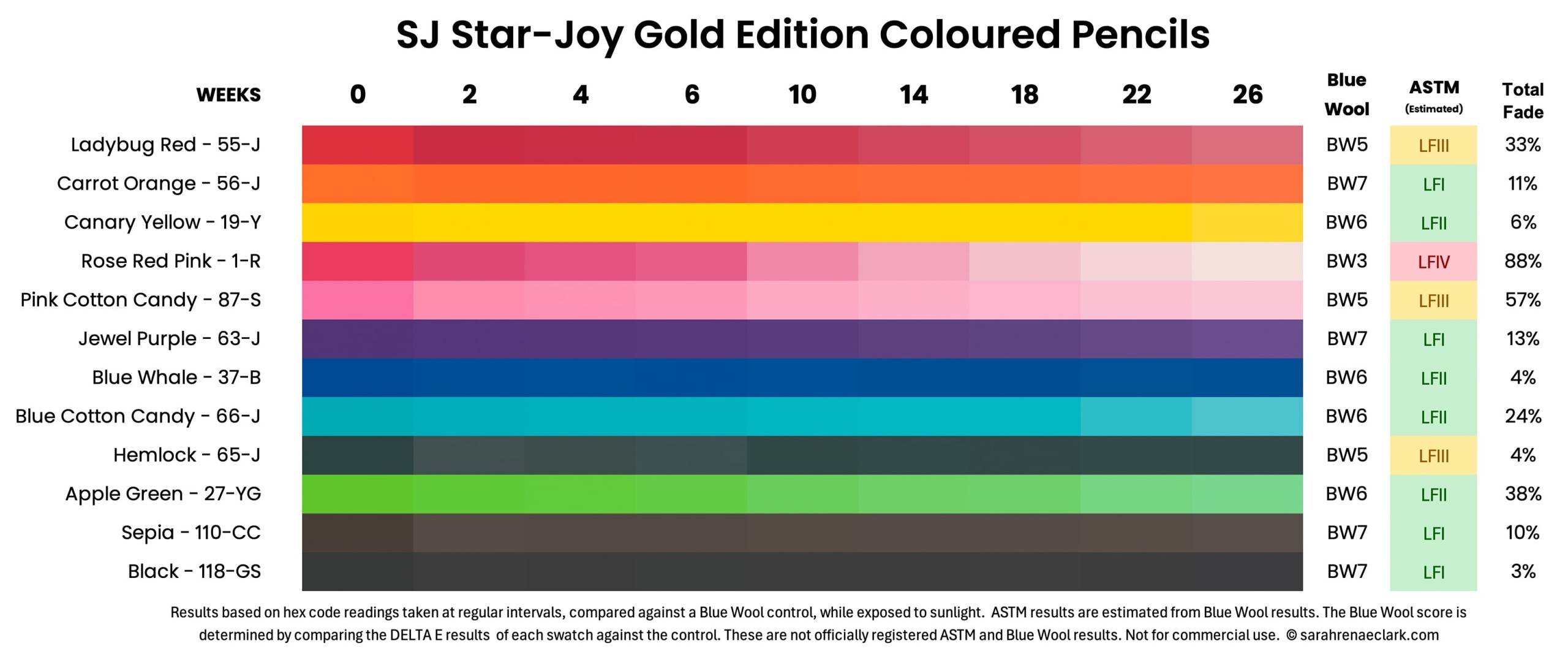
Lightfast Pencils*: 8/12 (67%)
Average Score: BW5-6
Average Fade: 24%
Best Performer: Black – 118-GS
Worst Performer: Rose Red Pink – 1 – R
Where to Buy: Amazon
Colours Tested: Ladybug Red – 55-J | Carrot Orange – 56-J | Canary Yellow – 19-Y | Rose Red Pink – 1-R | Pink Cotton Candy – 87-S | Jewel Purple – 63-J | Blue Whale – 37-B | Blue Cotton Candy – 66-J | Hemlock – 65-J | Apple Green – 27-YG | Sepia – 110-CC | Black – 118-GS
Staedtler Ergosoft Coloured Pencils
Staedtler Ergosoft don’t mention lightfastness on their packaging or online listings, and I couldn’t find any test data from the brand. Out of the 11 colours I tested, 3 were lightfast, 8 landed in the moderate range, and none scored in the lowest category. Some pencils held up surprisingly well, though most results were middle-of-the-road.
You can find all the tests done with these coloured pencils here.

Lightfast Pencils*: 3/11 (27%)
Average Score: BW4-5
Average Fade: 29%
Best Performer: 157-76
Worst Performer: 157-1
Where to Buy: Amazon
Colours Tested: 157-2 | 157-4 | 157-1 | 157-23 | 157-61 | 157-3 | 157-30 | 157-5 | 157-50 | 157-76 | 157-9
Staedtler Supersoft Coloured Pencils
Staedtler Supersoft, like the Ergosoft range, doesn’t include any lightfastness information on the packaging or in product listings. Out of the 12 colours I tested, 3 were lightfast, 7 were moderate, and 2 faded noticeably. Some colours held up well, but results varied quite a bit across the set.
You can find all the tests done with these coloured pencils here.

Lightfast Pencils*: 4/12 (33%)
Average Score: BW5-5
Average Fade: 32%
Best Performer: 149C-76
Worst Performer: 149C-25
Where to Buy: Amazon
Colours Tested: 149C-2 | 149C-4 | 149C-1 | 149C-20 | 149C-25 | 149C-6 | 149C-3 | 149C-30 | 149C-5 | 149C-50 | 149C-76 | 149C-9
Tombow Irojiten Coloured Pencils
Tombow does not specifically market their pencils as “lightfast”. They do offer some information on their website about lightfastness in general, including notes of colours that are more or less stable overall and some suggestions to protect your work from UV damage with spray fixatives or framing them behind glass.
You can find all the tests done with these coloured pencils here.

Colours Tested: Cameo VP-1 | DL-9 | Cascade VP-7 | Hummingbird DL-6 | Cinnamon DL-2 | Firefly Yellow F-6
Uni Posca Coloured Pencils
Uni Posca Pencils don’t mention lightfastness on their packaging or in online listings, and I couldn’t find any information about testing. Out of the 7 colours I tested, 3 were lightfast, 3 were moderate, and 1 faded quite heavily. Performance was decent overall, but if lightfastness matters to you, these might not be the most reliable option.
You can find all the tests done with these coloured pencils here.

Colours Tested: Coral Pink – 66 | Bright Yellow – 3 | Light Pink – 51 | Lilac – 34 | Mauve – 35 | Navy Blue – 9 | Ash Brown – 29
Winsor & Newton Coloured Pencils
The Winsor & Newton website says the “Studio Collection colour pencils have a high lightfast rating based on ASTM testing, which means your work won’t fade with time.” There’s no public information available yet on the testing, but a representative said to the Art Gear Guide: “the pencils have undergone some lightfast testing and they performed well, Winsor And Newton are currently undergoing more detailed lightfast testing.” Given their thorough testing of other supplies, I expect this is something they will provide in the future.
You can find all the tests done with these coloured pencils here.
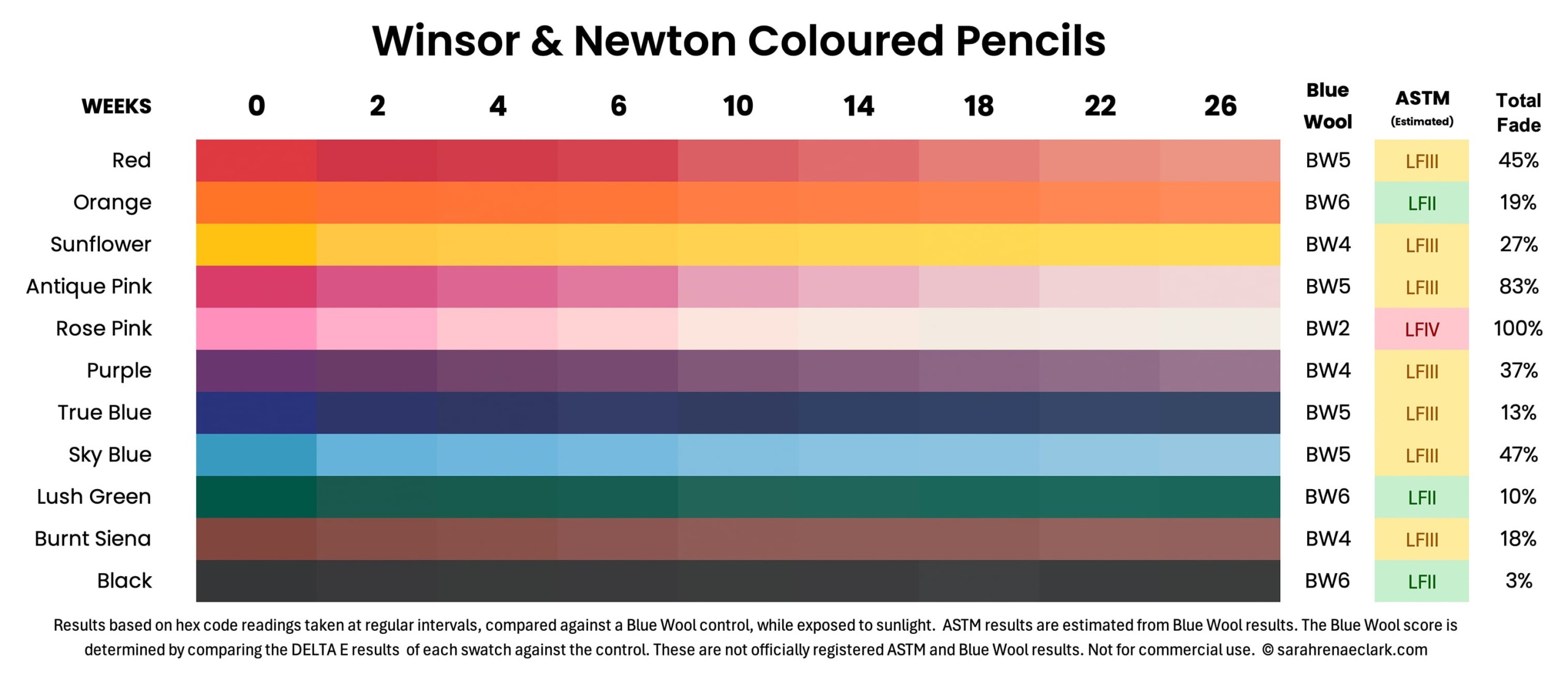
Colours Tested: Red | Orange | Sunflower | Antique Pink | Rose Pink | Purple | True Blue | Sky Blue | Lush Green | Burnt Siena | Black
Neon Coloured Pencils
Neon pencils were among the least lightfast. Most brands struggled to keep their brightness over time. Prismacolor and Colleen’s neons faded heavily across the board, and Arrtx wasn’t far behind. Brutfuner had one yellow that stayed strong but another that faded almost completely (you guessed it – pink). Tombow’s neon pencils performed a little better overall but still showed plenty of colour loss in most shades.
You can find all the tests done with these coloured pencils here.
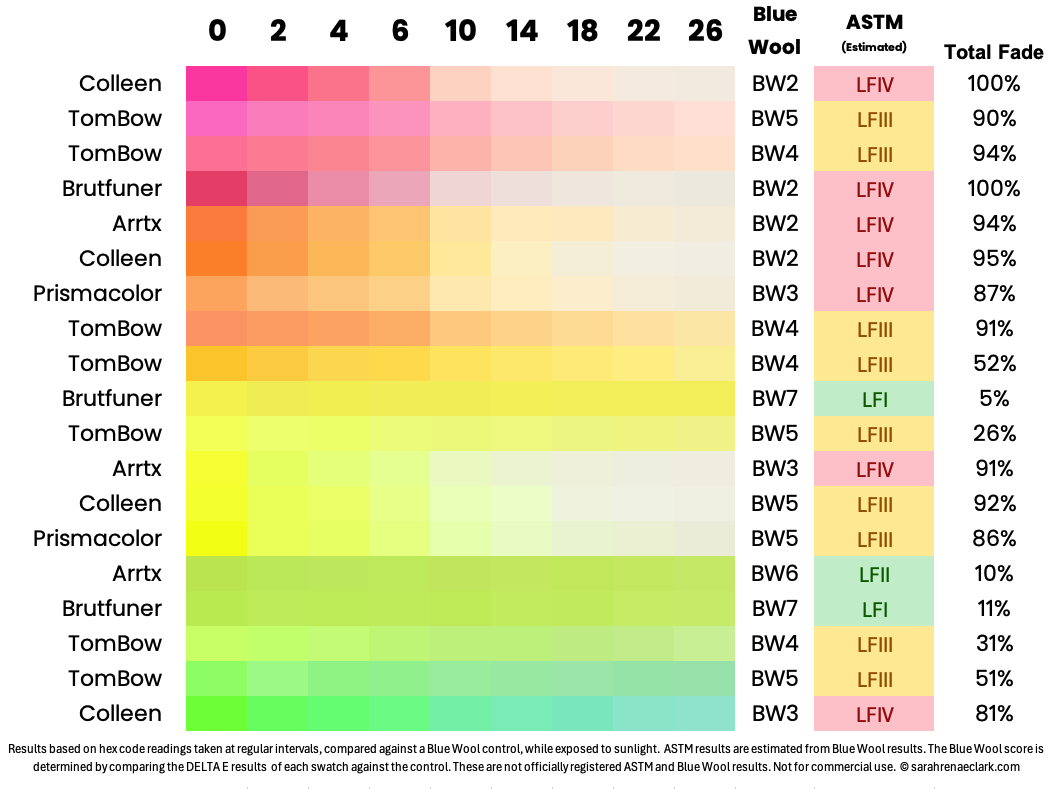
Colours Tested: Arrtx: Fluorescent Yellow – AT8002 | Fluorescent Orange – AT8011 | Chartreuse – AT5036 | Brutfuner: Yellow – 001 | Green – 118 | Pink – 120 | Colleen: Yellow | Orange | Green | Pink | Prismacolor Premier: Neon Yellow – PC1035 | Neon Orange – PC1036 | Tombow: Lightning Yellow – F-7 | Neon Green – F-8 | Flash Green – F-9 | Sunset Orange – F-4 | Equatorial Orange – F-3 | Surprise Red – F-2 | Plastic Pink – F-1
Markers
Out of all the categories tested, markers were the most vulnerable to fading. Alcohol markers, in particular didn’t hold up well – even well-known brands like Copic and Ohuhu showed noticeable fading, with some shades disappearing completely. Water-based markers performed slightly better in a few cases, but most still faded significantly over the six-month test.
Some brands that claimed to be lightfast did perform better. The Faber-Castell Pitt Artist Pens, for example, had two out of three colours hold up well, with one fading significantly. Talens Pantone markers had similar results – six out of nine colours stayed fairly strong, while a few still faded quite a bit. Winsor & Newton’s watercolour markers, on the other hand, struggled the most, with most colours showing heavy fading despite a few stronger performers.
You can find all the tests done with these markers here.

The markers fade over 6 months
Aqua by Spectrum Noir Water-based Markers

Arrtx Oros Alcohol Markers

Copic Classic/Sketch Alcohol Markers

Crayola Supertips Water-based Markers

Faber-Castell Pitt Artist Pen Brush

Karin Real Brush Pro Markers

Ohuhu Alcohol Markers

OLO Alcohol Markers
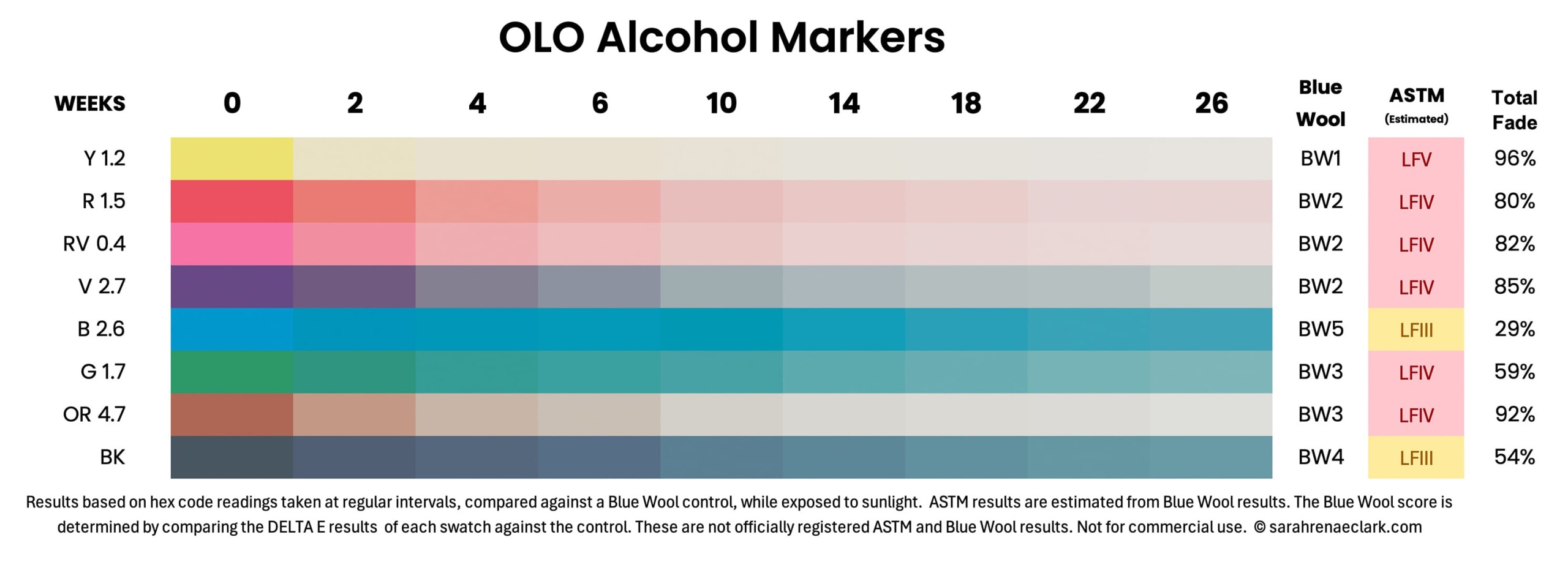
Prismacolor Premier Alcohol Markers

Sharpie Permanent Markers

Talens Pantone Water-based Markers
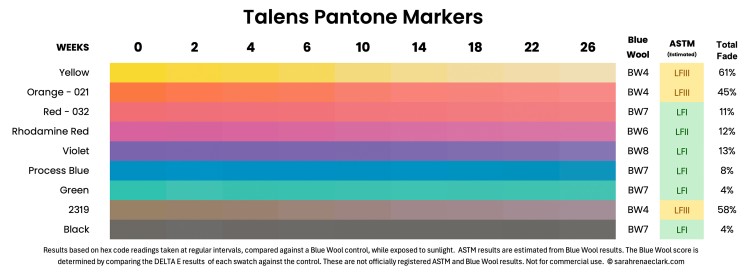
Tombow ABT Water-based Markers

Winsor & Newton Promarker Alcohol Markers

Zig Clean Color Real Brush Watercolour Markers

Winsor & Newton Watercolour Markers

My Insights
After six months of testing, I expected a few surprises – but I didn’t expect such clear patterns to emerge. One thing became obvious fast: pink is the first to go. In more than 30 brands, pinks faded faster than any other colour, with some disappearing entirely within just a few weeks.
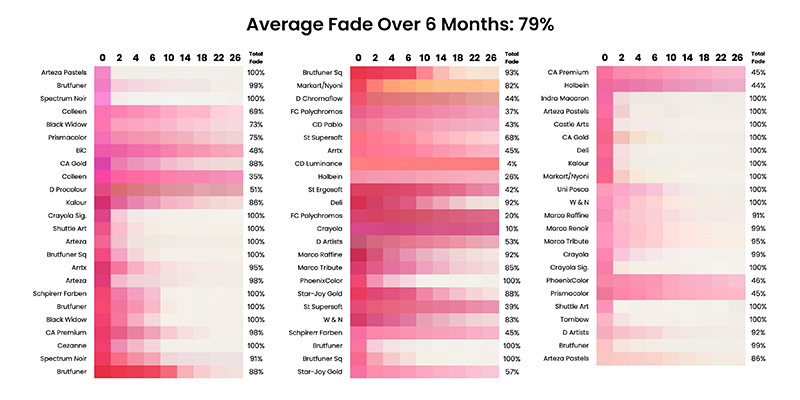
Another surprise? Some colours didn’t just fade – they changed. In pencils especially, I found oranges turning yellow and some brown tones shifting to green or grey. This often happened in colours made from multiple pigments – when one fades faster than the others, the remaining colour looks completely different.

Coloured Pencils
The Caran d’Ache Luminance and Derwent Lightfast ranges were extremely lightfast and hardly faded at all after 6 months. Most colours stayed bold and vibrant, with only minimal changes over time.
Faber-Castell Goldfaber, Faber-Castell Polychromos, Derwent Chromaflow, Derwent ColourSoft, and Koh-I-Noor Polycolour also performed exceptionally well, delivering dependable results.
Among the more affordable sets, Star Joy Gold stood out as one of the better performers. After 6 months, most of the colours showed only mild fading, which makes these great for the price.

Alcohol Markers
Markers were by far the most vulnerable category.
Alcohol markers, in particular, faded fast, even from well-known and expensive brands like Copic and Winsor & Newton. Some colours disappeared entirely.
Water-based markers didn’t fare much better. While a few showed slightly better results, most still saw significant fading by the end of the test.
Some of the markers advertised as lightfast did perform noticeably better, including the Faber-Castell Pitt Artist Pens, the Winsor & Newton Watercolour Markers, and the Talens Pantone. These all outlasted the other markers, although did still show some fading towards the end of my 6-month testing period.
If you love working with markers, your best option is to protect your work. Scan it, photograph it, or frame it with UV-resistant glass. Without protection, expect fading over time – especially in pinks and neon shades, which were the weakest performers across all brands.

Neons
Speaking of neons – they were some of the weakest performers in the entire test. Most neon pencils faded heavily, with only a few exceptions.
Colleen and Arrtx neon pencils showed some of the worst results, with many losing over 90% of their colour.
Prismacolor neons didn’t fare much better, both fading above 85%.
Brutfuner’s results were mixed. Two of their neons held up fairly well, but one faded completely.
And Tombow was slightly more consistent, though still far from ideal – most of their neons faded between 50–90%, with only one staying under 30%.
Across the board, neons were unreliable. Some colours faded more than others – like the pinks! If you’re planning to use them in artwork you want to last, definitely consider scanning or take steps to protect the original.
By Colour
When I grouped the results by colour, the pattern became even clearer.
Black pigments were the most reliable across the board, with hardly any fading.
Oranges and purples gave more mixed results. Some shades held up fine, but others faded significantly – one particular orange showed noticeable fading in seven different brands.
Lighter and mid-range purples were especially prone to fading.
And pinks were by far the weakest. In more than 30 brands, pinks had already faded significantly within the first 2 weeks, and were completely gone by the end of the test.


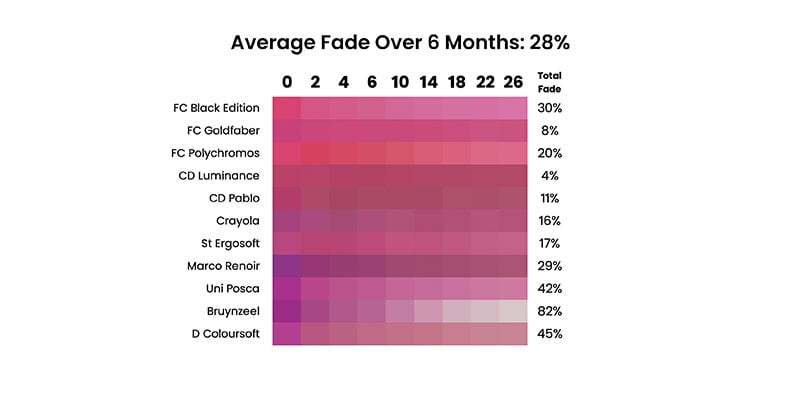


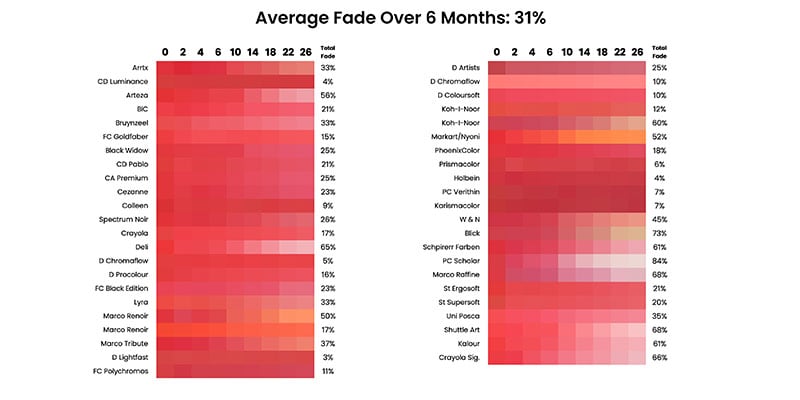



Final Thoughts
Lightfastness might not be the first thing you think about when buying art supplies, but if you want your work to last, it matters more than you might expect. After six months of testing, one thing is clear: not all “lightfast” claims are created equal, and some colours – especially pinks and neons – are far more vulnerable than others.
This doesn’t mean you need to throw out your favourite supplies. Instead, it’s about making informed choices. If you’re creating something to display, gift, or sell, consider using materials with proven lightfastness or taking steps to protect your work. For everything else, use what you enjoy.
I hope this guide has helped demystify lightfastness and given you a better understanding of how your tools perform over time.
PLEASE NOTE: This post contains affiliate links, which means I may earn a small commission if you make a purchase – at no extra cost to you. I purchased most of the supplies used in this review, but some items were given to me for previous videos by the brands. These include: Arrtx, Black Widow Monarch, Derwent Chromaflow, Karin, Ohuhu, OLO, Sharpie, Spectrum Noir, Staedtler, Talens, Winsor & Newton, and Woomer.
None of these brands are associated with this review in any way, and all views and interpretations are my own.
Where I’ve referenced product descriptions, quotes, or claims from external websites, those details were accurate at the time of writing but are subject to change.
* The “Lightfast Pencils” count refers to the number of pencils that received a score of BW6 or higher. This is recognised in the industry as “very good” to “excellent” lightfastness.
I Tested Every Colored Pencil to Find the BEST ONE…
and here are ALL the results!
Of course, taking 90+ pencils through 11+ different tests (along with extra research on other factors) adds up to a LOT of information for one blog post. So I’ve broken this article up into a (hopefully) easy-to-navigate mini website for you, where you can go on your own mini journey to find the best colored pencils for any situation.
Blending
If you can learn to blend pencils, you can color almost anything. But not all pencils blend the same. With the right paper and the right technique, you can blend ANY brand of pencils. But some pencils just make this easier and produce better results for both beginners and advanced artists. Through 2 tests, I identified which colored pencils were the easiest to blend together.
Layering
I tested how many layers each pencil can make. Building up layers allows you to mix colors, create smoother blends, and have a lot more overall control in what you are creating. It’s important if you’re wanting to create realistic textures or draw a photorealistic portrait.
Durability & Strength (coming soon)
If pencils are dropped or damaged, they can break along the entire core, making them crumble. Some pencils are built to be more durable and resist breakage, so I tested which pencils could handle more pressure and would be less likely to break. I also tested which could hold a sharp point for the longest.

Erasability (coming soon)
I want to see which colored pencils can be erased, whether I’ve colored lightly or colored heavily. This can actually be a clever way to create highlights or bring back lighter areas when drawing things like hair or fur. And, of course, erasing is helpful if you’ve made a mistake.

Water-Resistance (coming soon)
I wanted to test if the pencils are water resistant or water soluble. If you’re wanting to use your colored pencils with mixed media or any kind of sealing spray or fixative, you want to be sure that it’s not going to move if it gets wet. Or in some cases, you may prefer a water-soluble pencil.
Pencil Barrel Design (coming soon)
For this test, I looked at whether the pencil barrel matched the color of the actual core, and rated the pencils according to whether they included color names, numbers, and displayed easy-to-read fonts and colors.
Other things tested (coming soon)
I also tested color intensity, opacity on dark paper, performance on markers, along with researching some general information about the pencils. Read about it here.
Lightfastness
I did my own scientific blue wool lightfast testing on over 50 coloured pencils and even some alcohol and water-based markers to find out which coloured pencils are the most lightfast. You can find all the results here.

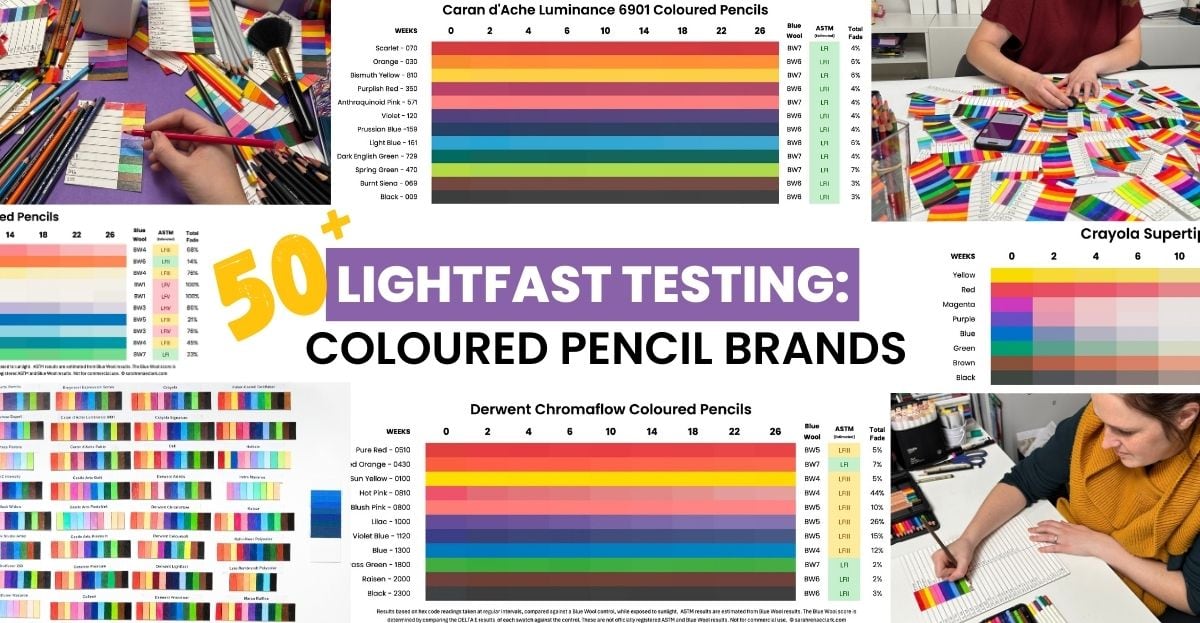




















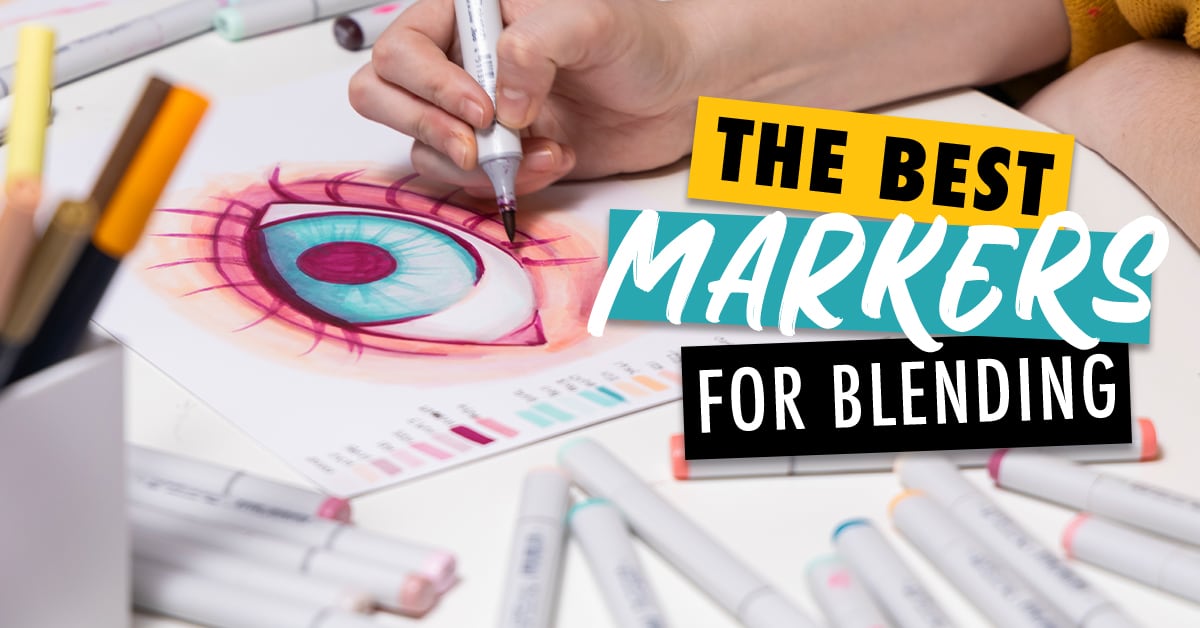




A-mazing, I appreciate this SO much, wow!!! So useful for artists they know what they get into in regards to lightfastness.
Thank you!
Says lot what i going mainly use.
THANK YOU FOR THE USEFUL INFORMATION.
I WAS A SELF TAUGHT ARTIST TEN YEARS AGO.I COULD NOT EVEN PAINT A TREE.
AFTER MUCH IMPROVEMENT WITH PAINT I SWITCHED TO COLOURED PENCILS.
I USED DERWENT COLOURSOFT FOR MANY YEARS AND ALSO PRO COLOUR AND DRAWING PENCILS.
I AM NOW USING DERWENT CHROMAFLOW OF WHICH I FIND VERY EASY TO USE.
I FIND ALL DERWENT PENCILS VERY SATISFACTORY.I WAS HAPPY TO HEAR THE RESULTS ON YOUR TESTING.
I MUST MENTION THAT I AM NOT PAST TO USEING OTHER BRANDS YOU MENTIONED AND DO SO.
I HAVE PURCHASED TWO TINS OF BRUYNZEEL PENCILS WITH MIXED FEELINGS.I WOULD LIKE YOUR OPINION ON THESE.
KIND REGARDS COLIN( 86 YEARS OLD FROM AFRICA)
I’ve read and been told by museum staff that uv glass and sprays offer temporary protection. How long they work depends on the thickness of application/glass, strength and amount of light, etc.
Perhaps testing how much these products actually work at various thickness of application and time would be a next step.
I see so many artists recommending using them over poor lightfastness products, implying it will be a long term solution.
Thanks for letting us know, that is super interesting – Natalie (Team Sarah)
Hi, I’m a first-time viewer and your experiment just came up in my YouTube recommended feed! As a hobbyist artist and professional scientist, I am absolutely fascinated by this experiment. I would be very interested in seeing a full spreadsheet of the data (which I saw in another comment may be shown in a later blog post).
In my art, I’m very interested in creating dynamic pieces that change over time without human intervention; I’m planning to use this data to pick the most- and least-lightfast color sets to create pictures that change over time. I hope I’m a good enough artist to actually make it look interesting…
Have you considered looking at the components of the pigments to see which specific components are breaking down? (Is that even possible? I imagine that this information could be company intellectual property and is not shared widely.) My grandmother was a ceramic chemist; I believe her research was related to how chemistry of glazes interacted with each other. In pottery (my primary medium), you can identify specific compounds which interact for different results, though the reaction often depends on the amount of glaze on the piece and the temperature and oxidation of the kiln and is often a toss-up. I’m wondering if there could be components inside of the pencils or markers that could interact and have different fading effects. I imagine that the pigments in pencils and markers wouldn’t necessarily interact in the same way, so much as layer on top of each other and respectively fade at their normal rates (like we saw with the orange in the video). I suppose this would need to be tested in a whole follow-up experiment, where swatches would be a mix of two colors to varying degrees. (I don’t even want to think about how many swatches that would need!!)
Thank you for sharing this fascinating experiment! I will be thinking about it in my next art pieces
Thanks for your comment. I believe Sarah would have loved to continue down the massive rabbit hole that is lightfastness, but she didn’t have the time to continue down that particular one. I would imagine that information would be pretty hard to gain access to, though. I will bring this up with Sarah and see if she is interested in exploring that further. Thanks again – Natalie (Team Sarah)
this is such a fantastic comparison, the results are genuinely shocking for some of these pencil. it goes to show, artists recommend certain brands despite pricing for a reason! thank you so much for doing this
this is great to see such thorough testing, as brands can be pretty opaque about what and how they test their claims .
would have liked to have seen Derwent drawing pencils on the list, they seem very similar to Derwent lightfast, and both these are my favourites (and and it’s good that lightfast live up to their name and claims).
my fav pens are pitt pens so would be interesting to see testing on further colours in that range , I also like using ecoline watercolour markers that arent tested, i believe they fade super quick too.
i don’t get much direct sun in my flat but i might try some basic tests myself
great work, it’s interesting data. brands should employ Sarah to test for them :)
Facinating! You deserve an award! I once wrote an entire book ( much like a journal) of uplifting, life changing quotes, in careful caligraphy, with “special” markets from Hobby Lobby…an a year later the pages were completely blank!
Sarah, thank you so much for doing this test. I pretty much knew how some of the pencils would fade, but my surprise was Prismacolor and Holbein. Always enjoy and appreciate your work and videos.
Lots of work here, thank you for sharing. I have always known that pinks and lighter colors usually fade fastest, but your results were really eye opening. Even though I don’t display or sell my work, I usually opt for higher end products, just a personal preference, but it’s really important if you do display or sell work that you make sure you do all you can to preserve it properly. I think using UV resistant glass is probably your best bet, along with good light fast pencils, etc…
Wow – what an amazing and valuable body of work. Thank you so much. The information regarding the pinks is especially valuable. It shows that, in most instances, you really do get what you pay for!
I was especially interested in some of the pencil sets that I own, so I checked out the Prismacolour Premiums. Just wanting to check – you singled out the Mulberry as being the worst fade, and the Aquamarine as the best. However, I could not see them included in the pencil list below. Just wondering if there had been a mix up in that group, or if I have mis-read the information. This is by no mean a criticism, just a query.
Love your enquiring mind, and your pursuit of excellence.
Thanks for doing all the work! Glad to know I have several sets of very good pencils
Thank you. This was very ‘enlightening’ and I’m happy to know that I have some really substantial pencils In also have some not so great.
Hi Sarah
I have an interesting follow-up experiment I think could be interesting. It doesn’t need to be large scale, and I can do it myself here, and write up the results in 6 months.
I cartoon and draw with colour pencils as a hobby, and when I started taking commissions, I went to my local art shop and asked for advice on making my art lightfast and durable. I was recommended a can of “fixative spray” that you spray onto the artwork to provide a coating, which supposedly “protects” it from smudging, dust, and UV light.
I have two different brands in my studio here, Windosor&Newton, and Daler Rowney. I also have sets of some of the pencils you tested, FC Polychromos, Ergosoft, Tombow Irojiten.
So I reckon I can swatch out a few of the specific pencils you tested, some that were lightfast, and some that faded badly, and put one swatch in my window, one in a dark box, and one in the window for each of my fixative sprays, then in 6 months we’ll see if these “uv-protection treatments” have any effect!
Sounds interesting to me. If you’d like more information, or for me to notify you of the results directly, drop me an email.
That would be such an interesting experiment and we would love to see the results once done. You can send them to [email protected]. Can’t wait to see them – Natalie (Team Sarah)
1. This is freaking awesome! No one puts in the work like you do. Thank you
2. I think you meant Polycromos in this sentence in your summary section “Faber-Castell Goldfaber & Chromaflow, Derwent Chromaflow & ColourSoft, and Koh-I-Noor Polycolour also performed exceptionally well, delivering dependable results.”
So glad you like it and yes we did. We are changing it now :)
Thank you so much for all the effort you have put into this – and for your generosity in sharing your results!
Living in the UK, I have a window of 2-8 weeks a year when I can do lightfast testing (at a sensible rate, that is), so testing everything I have would take years. And the swatches and labels would be peeling off for me because of high humidity not
because of the heat!
Very relieved that the brands I use for artwork I sell are as good as they say they are: CD Luminance, D Lightfast, sime Polychomos and occasionally D Colourfast (they are my daughter’s, but some of the LF ones are perfect…
Also, I’m pretty stoked that my go-to brand for gifts (Crayola) is really truly THAT good!
PS I think some of the labels have got slightly mixed up – but given the amount of labelling and the sheee volume of pictures included here…
From a fellow professional pencil artist I applaud you so much on these tests! I also shake your hand with understanding as I am an obsessive nerd when it comes to pigments and lightfastness. Whilst I have only done a handful of tests myself, I have given your video and blog a big shout out to my own students and followers and will continue to do so. Out of interest, would you be ok to share the brand of paper that you tested on please? Apologies if I missed it. Am also off to buy a colour sensor so thank you for the heads up on that too. So much fun and nerdiness ahead :)
Sarah used archival paper and I’m so glad you like it.
What an exceptional work and , even for non professional artists, very interesting! I just wanted to mention a small typo: Under „My insights – colored Pencils“ you mention „Faber Castell Goldfaber & Chromaflow“, that should be „Goldfaber & Polychromos“, right?
I am looking forward to your next projects, they are always as entertaining as they are educational!
Can we get the raw data you collected? I think it would be really interesting to explore
some of the raw data will be added to the nerdier blog post that will be added this week.
Well done! Impressively thorough methods and record-keeping.
The Colored Pencil Society of America does its own independent lightfastness testing using the blue wool scale, as you pointed out. An excellent benefit of CPSA membership is its Lightfastness Testing Results Workbook, which includes the results of *every* color in the largest set of each brand. It also re-tests brands over time, in case a manufacturer changes their recipe or their process without publicizing. This is useful for folks who have a full set and want to avoid using–or even cull–fugitive colors–a good plan if you want to avoid both the temptation to use them and the surprise when someone who has your drawing wants to know why “it looks odd” a couple of years later.
Fantastic! Thanks for all that hard work.
Susan
Thank you this was really helpful and made me feel better about buying expensive pencils and gave me directions for which watercolour markers to invest in. I have to say I’m so surprised with the Crayola results I expected them to fade right away. Thank you Sarah lots of love
Hello, I truly enjoyed and appreciated the video and blog on the lightfastness of colored pencils as I use them over my watercolor. Question, I have the Derwent Chromaflows. What pinks do I need to replace with either the Luminance or Derwent Lightfast. Thank you for all your amazing work!!! Cheers, Tracy
Hot pink (0810) is the pink that faded the most in the Derwent chromaflow range. You will have to research which pink from the Caran d’Ache or the Derwent to replace that with but from our research the hot pink faded more.
Hi Sarah, thank you so much for testing this, it sounds like it has taken you forever but the results are great. Really makes you think about the price points and quality of the pencils we are looking at!
I think there’s a small typo under “My Insights” for “Coloured Pencils” where it says “Faber-Castell Goldfaber & Chromaflow, Derwent Chromaflow & ColourSoft,” at the beginning of a line. I believe it should be Faber-Castell Goldfaber & Polychromos?
Thank you for letting us know. We are changing it now :)